The personal touch
Stow Healthcare’s operations director Ruth French explains how her hands-on leadership approach has been central to her success

Opinion:
Professor Martin Green discusses government changes to Care Worker Migrant Visas
On the road:
Care England champions change at annual conference
Care for tomorrow: Lovett Care’s new robotic team member
04/2024 April Edition caring-times.co.uk

Helpingyo g thecomplex
Providers of regulated activity operate in a challenging and highly regulated landscape. As leading legal advisers in the health and care sector, Mills & Reeve is a law firm who can support you every step of the way.
CQC inspections and enforcement action
CIW inspections and enforcement action
Safeguarding investigations
Police investigations and prosecutions
Health and safety enforcement Inquests
To find l d li k h to see Aman Partne Aman 01223

business



14 POLITICS & POLICY
MPs discuss implications of government changes to social care visas

17 SURVEYS & DATA
Age UK says older people’s right to liberty is not being protected in care homes
10 LEADER'S SPOTLIGHT
Stow Healthcare’s operations director Ruth French explains how her handson leadership approach has been central to her success

22 WOMEN IN CARE
Leaders explain how Aria Care is championing female leadership

Still the forgotten service
Another Budget. Another snub for social care. World weary care leaders were understandably dismayed to hear the sector had been left in the cold yet again by the government in the Spring Budget.
The writing had been on the wall ahead of the statement, amid growing rumours that the government would target shortterm tax cuts at the expense of long-term investment in care in a bid to curry favour with voters ahead of the general election.
The sector’s worst fears were confirmed when the chancellor announced a 2p cut in National Insurance and a £3.4 billion fully funded NHS productivity plan focused on digital transformation but nothing for social care.
As a politically sensitive problem, requiring a long-term solution social care is always destined to come worse off in the short-term electoral cycle, which is led by political expediency.
It therefore came as no surprise that social care was snubbed again as we edge closer to election day.
Lack of content on social care in the main parties manifestos also bodes ill in the short to medium term, whoever is elected.
Of course, Jeremy Hunt, should have know better. In his previous life, as chair
of the Health and Social Care Committee in October 2020 he said “the government must use the spending review to raise the annual adult social care budget by £7 billion by the end of the parliament as the starting point for a wider series of reforms”.
Hunt went on to say: “To address wider issues the sector needs a 10-year plan and a people plan just like the NHS. Without such a plan, words about parity of esteem will be hollow. We owe it to both the staff and families devastated by loss to make this a moment of real change.”
Sadly, with his hands on the levers of power, Hunt’s words have been just as “hollow” as the leaders he previously admonished and the vulnerable people who depend on a healthy and well-functioning social care service have been let down again.
Lee Peart, Editor-in-chief Caring Times

business | welcome 4 | APRIL 2024 CARING-TIMES.CO.UK
Chief executive officer Alex Dampier Chief operating officer Sarah Hyman Chief marketing officer Julia Payne Editor-in-chief Lee Peart Features editor Charlotte Goddard Subeditor Charles Wheeldon Advertising & event sales director Caroline Bowern 0797 4643292 caroline.bowern@nexusgroup.co.uk Business development director Mike Griffin Business development executive Kirsty Parks Event manager Conor Diggin Marketing content manager Sophie Davies Publisher Harry Hyman Investor Publishing Ltd, 3rd Floor, 10 Rose and Crown Yard, King Street, London, SW1Y 6RE Tel: 020 7104 2000 Website: caring-times.co.uk Caring Times is published 10 times a year by Investor Publishing Ltd. ISSN 0953-4873 © Investor Publishing Limited 2023 The views expressed in Caring Times are not necessarily those of the editor or publishers. Caring Times™ and the CT® logo are registered trademarks of Nexus Media Group @Caring_Times linkedin.com/company/caring-times business contents 6 NEWS IN BRIEF Our round-up of last month's big stories 8 OPINION Professor Martin Green discusses changes to the Health and Social Care Worker visa 10 LEADER'S SPOTLIGHT Ruth French's hands on approach to care leadership 14 POLITICS & POLICY MPs discuss implications of government changes to social care visas 16 SURVEYS & DATA Public failing to prepare for later life care 17 SURVEYS & DATA Age UK says older people’s right to liberty is not being protected in care homes 18 SUSTAINABILITY MATTERS Hartford Care connects with communities and Jonathan Freeman on how social care is reducing carbon emissions 20 PROPERTY & DEVELOPMENT We round-up last month's deals 22 WOMEN IN CARE Aria Care champions female leadership 24 PEOPLE MOVES Last moves big moves in the sector 26 LEGAL & REGULATORY Mills & Reeve on one word ratings and RWK Goodman on data requests

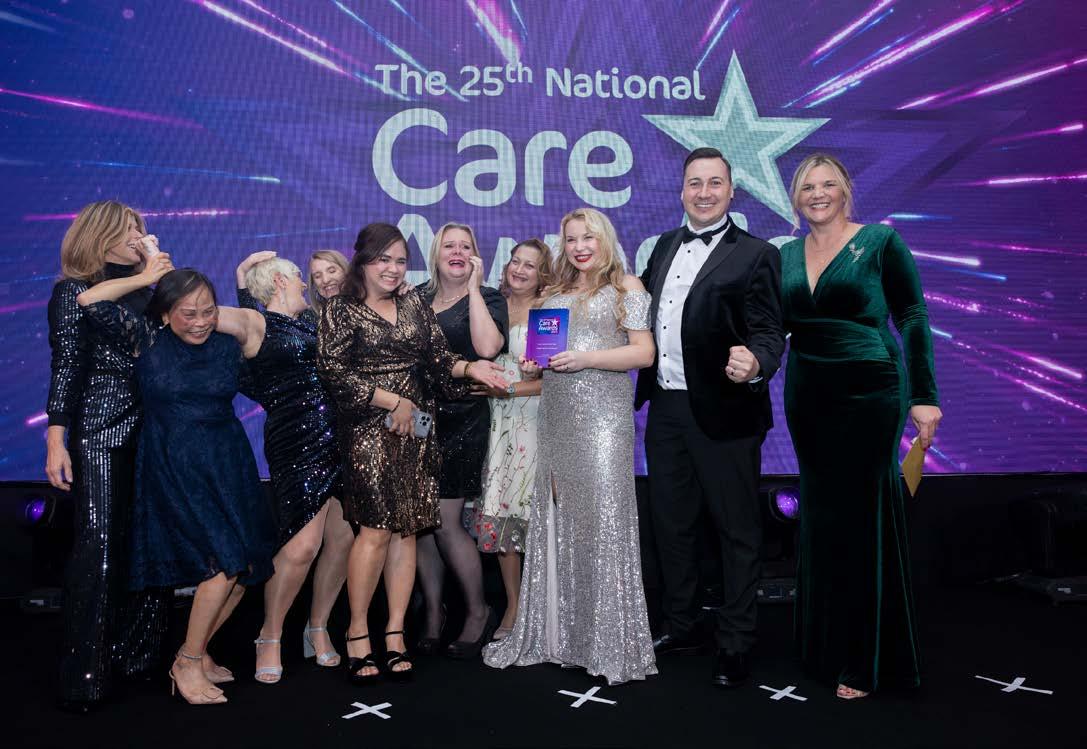

News in brief
POLICY & POLITICS
Care leaders slammed Jeremy Hunt's Spring Budget as a “non-event” for older people. While cutting National Insurance by 2p and providing a £3.4 billion fully funded productivity plan for the NHS, the announcement offered no new money for social care.

The Commissioner for Older People for Northern Ireland, Eddie Lynch, called for stronger protection for residents from being removed from care homes without good reason. In a new report, Lynch said the Regional Care Home Contract between health and social care trusts and care home providers was failing to protect residents from being evicted to another care home for reasons other than a change of care needs.
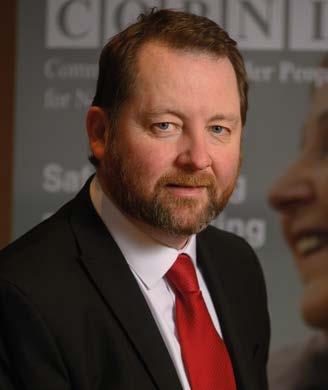

New rules on overseas care worker visas were introduced by the government. The laws, which are designed to cut net migration and tackle visa abuse, ban overseas care worker dependants and require all sponsored workers to be registered with the CQC.

A £20 million investment in innovative projects to support people in adult social care and unpaid carers was announced by the government. The first tranche of the £42.6 million Accelerating Reform Fund over 2023/24 and 2024/25 is being allocated to lead local authorities, covering all 42 Integrated Care Systems, which deliver adult social care services and will work with a range of partners including the NHS, care providers, voluntary and community groups.
A new report revealed strong backing among MPs and the general public for social care worker pay parity with the NHS. Community Integrated Care’s ‘Who Cares Wins: Unfair To Care 2024’ said there was a once-ina-generation opportunity to end the enduring workforce crisis in social care, with exclusive public and MP polling finding consensus that the social care pay gap and workforce shortages must be addressed.
PROVIDER NEWS
Somerset Care cited “financial challenges” in launching a consultation on the closure of two residential care homes. The not-for-profit provider said its 1970s-80s properties, Critchill Court in From and Sunnymeade in Chard, were “regrettably unable to keep pace with the increasingly complex care requirements of 2024 and beyond”.
Six care homes run by Agincare, Country Court Care Homes and HC-One signed up to a new charter designed to improve workers’ rights. The agreement with Southwark Council meant around 75% of employees in the borough will benefit from better working terms and conditions.
HC-One was fined £400,000 following the death of 95-year-old Susan Greens who was found in an external courtyard at Springfield Bank Care Home in in Bonnyrigg near Edinburgh in December 2021 after she
business | news 6 | APRIL 2024 CARING-TIMES.CO.UK
Jeremy Hunt
Eddie Lynch
Barchester plans to spend £2.2 million on installing solar panels at 37 care homes
Helen Whately

had fallen unsupervised.
Social care charity Guild Care awarded its carers and support workers a pay rise of up to 12%. From this month, all care rates of pay will be at a minimum of £12 an hour, benefiting more than 240 employees. This is above the government’s compulsory National Living Wage which rises by 9.8% to £11.44 per hour when it comes into force this month.
Barchester Healthcare said it was stepping up investment in green technologies this year with plans to spend £2.2 million on installing solar panels at 37 care homes. The move followed a total investment of £1.9 million in upgrading 13 plant rooms, installing energy-efficient LED lighting in 56 homes and installing 3,672 solar panels provided by EES Group at 18 homes last year.
The Orders of St John Care Trust (OSJCT) renewed its commitment to paying the Real Living Wage. From 1 April 2024 all OSJCT employees will be paid at an hourly rate of £12.00 or above, and all care employees will be paid an hourly rate of £12.17 or above.
Black Swan Care Group also renewed its commitment to providing the Real Living Wage to all employees. All staff will be paid at least the Real Living Wage of £12 per hour from next month.
A Borders care company had its licence to sponsor overseas care workers revoked by the Home Office. The Home Office said Support Services 1st Choice Limited had not been compliant with requirements for organisations that hold a sponsor licence and sponsor migrant workers.
PROPERTY & FINANCE
Cinnamon Care Collection refinanced two luxury homes with lender Leumi UK in a £23 million arrangement: Watermeadow Grange in Exeter and The Gables in Worcestershire. The Cinnamon Care Collection is a group of 19 luxury care homes and retirement developments across the UK.
Healthcare real estate fund Elevation Healthcare Properties acquired 11 properties from Clariane and simultaneously leased them back to Berkley Care Group on inflationlinked, long-term leases. The total consideration to Clariane was £207 million. Berkley Care operates 12 modern care homes across England comprising 805 beds.
LEGAL & REGULATORY
The boss of an unlawful care home investment scheme was banned from being a company director for 14 years. Robin Forster was a director at Qualia Care Properties and Qualia Care Developments, which the High Court ruled last year was an unlawful investment fund.
Almost all care homes forced to close by the CQC in England are run on a for-profit basis, new analysis found. The Nuffield Foundation funded research by the University of Oxford was published in The Lancet.
Three arrests were made by the Serious Fraud Office (SFO) as part of an investigation into an alleged £76 million luxury care home fraud. The raids in St Leonard’s, Dorset and Aylesbury, Buckinghamshire were part of an investigation into the UK
registered property developer, the Carlauren Group, which went into administration in November 2019, requiring some elderly residents to vacate their homes and leaving over 600 investors out of pocket.

WORKFORCE
HC-One expanded sick pay entitlements to more colleagues in its care homes. The agreement with the GMB union meant thousands of care workers will receive statutory sick from their first day of absence.
TECHNOLOGY
Home care provider, City & County Healthcare Group, rolled out the Staffbase employment app to 14,000 people at its 220 sites. CCH Group said the move was part of its strategy to connect the company, recognise employees and elevate the role of care workers.

news | business CARING-TIMES.CO.UK APRIL 2024 | 7
The Gables, Worcestershire, part of Cinnamon Care Collection
Give with one hand, take with the other
Professor Martin Green, chief executive of Care England, assesses the effect of government changes to the Health and Care Worker visa
The UK government recently changed the Health and Care Worker visa, which has raised concerns and sparked debates about its impact on the care sector. The changes to the Health and Care Worker visa have significant implications for the recruitment and retention of care workers in the UK and for the overall functioning of the care sector.
Social care is amid a workforce crisis and we have more than 152,000 vacancies across the sector. We also suffer from a 40% turnover rate. This is having a significant impact on people’s ability to deliver care and to maintain quality and consistency. In many areas, care providers have reduced the number of people they support specifically because they cannot get staff in either front line or specialist roles, such as nursing. This nursing shortage is challenging and over the years we have seen many nursing homes re-register as care homes purely because they could not get the appropriate staff. The roots of this workforce challenge lie in several areas, but the combination of Brexit and a global pandemic has put severe pressure on the social care workforce and destabilised many services. Agency staff are also costly, but because of regulation, many care providers are forced to pay for agency staff to deliver
"One of the fundamental changes introduced by the government is removing the right for care workers to bring in dependants."
the required safety and quality of care.
One of the fundamental changes introduced by the government is removing the right for care workers to bring in dependants. This will significantly change the number of people available and can also impact people’s ability to settle into their new roles. When the government put care workers on the shortage occupation list, we felt this was a real opportunity to reach out to skilled people from across the globe and encourage them to work in the UK social care system. Like many governments, after a while, they tend to tinker with the system as it becomes more familiar, and this was certainly the case with this government and the shortage occupation list. Care workers are required to have an agreed salary, which is often more than people who enter the profession from the UK. However, in making changes, the government still allowed care workers to have a lower entry point in terms of salary than many other professions. This was greatly welcomed because it would have been completely unsustainable if we had been required to pay a higher level. We would not have been able to recruit overseas staff because of the impact this would have had on our budgets and differentials.
However, the government gave with one hand and took away with the other by instituting new criteria that removed the right of care workers to bring in dependants, yet they left this right in place for people who entered to work in the NHS. The government learned no lessons from the pandemic. During the pandemic, they introduced mandatory vaccinations but only imposed them on the care sector, not the NHS. This meant that we lost 30,000 staff who did not want to be vaccinated, many of whom went into the NHS. There is no justifiable reason why you would introduce mandatory vaccination in
"The government has not only introduced restrictions on the ability of care workers to bring their family members to the UK but has also introduced limitations on their access to public funds and benefits."
social care but not in the NHS. In truth, the difference in the way in which the NHS is treated compared to social care, I believe, lies in the fact that the NHS is accountable to politicians and they will not do anything that might cause a problem in this organisation because, ultimately, they hold the line of accountability. This is different in the care sector. Politicians are quite willing to bring in policies that differentiate health and care while at the same time talking about integration and spending billions of pounds of taxpayers' money on changing the structure of clinical commissioning groups to integrated care systems, pretending this will deliver integration when much of their strategic policy position is completely at variance with that objective.
Furthermore, the changes to the Health and Care Worker visa have also impacted the rights and benefits available to care workers once they are in the UK. The government has not only introduced restrictions on the ability of care workers to bring their family members to the UK but has also introduced limitations on their access to public funds and benefits. These restrictions have raised concerns
8 | APRIL 2024 CARING-TIMES.CO.UK business | opinion

"Care workers need to be as skilled and respected in the same way as anyone who works in the health system."
about the welfare and wellbeing of care workers who may be separated from their families and face financial
challenges while working in the UK. Overall, the UK government's changes to the Health and Care Worker visa have been widely criticised for their potential negative impact on the care sector. The government has created barriers that may hinder the recruitment and retention of care workers from overseas by introducing minimum salary requirements and imposing restrictions on rights and benefits. This could exacerbate staffing shortages in the care sector, impact the quality of care provided to vulnerable individuals, and ultimately undermine the sustainability of the care sector in
the UK. However, the worst bit in all these changes is the constant separation between health and social care staff. Anybody who works in the NHS is treated like a first-class citizen, and anybody in social care is deemed not worthy of the same status and respect. We will only have integration once we have more aligned terms and conditions and we also need parity of esteem. The people working in social care are vital and the people they support have many complex needs. Care workers need to be as skilled and respected in the same way as anyone who works in the health system.
CARING-TIMES.CO.UK APRIL 2024 | 9
Professor Martin Green
The personal touch
Lee Peart talks to Stow Healthcare’s operations director Ruth French about how her hands-on leadership approach has been central to her success
Owned and managed by Ruth French and her brother, Roger Catchpole, premium care home operator, Stow Healthcare, has developed an enviable reputation as a serial awards winner in recent years and four of its eight care homes are now rated Outstanding.
And since launching in 2010, French and Catchpole have established Stow Healthcare as a turnaround specialist.
As the operational head of the business, French takes a real pride in leading from the front and stresses the importance of being seen in her eight care homes in Essex, Norfolk and Suffolk.
The latest homes to be added to its portfolio in 2022 were Horkseley Manor in Colchester, acquired from Larchwood Care, and Manson House, acquired from farming charity RABI.
French says her “on the ground” presence had been crucial in understanding the homes and integrating them with Stow Healthcare’s culture and practices.
“The homes were in different positions quality wise,” French explains. “Manson was rated Good and I have never had any concerns about the care being delivered, but financially it was in a really difficult position.
“Hawkesley had just been rated Requires Improvement and had several years of fluctuating leadership.”
French describes the homes as services needing “quite different approaches”.
“That’s my role on the ground which is going into a new acquisition and
"We know what is needed to turn a home around now.
We know all of the ingredients to do that.”
understanding what it is that we need to turn this home around,” she continues. “Very often the ingredients for baking that cake are very similar, so you might be putting slightly different toppings on it. We know what is needed to turn a home around now. We know all of the ingredients to do that.”
French says Stow Healthcare has become better and quicker over time at delivering turnarounds.
“What I bring to that is the boots on the ground of actually being in the homes physically, of talking to the staff and listening to them and understanding what’s working and what’s not working and putting in place the structures and helping them feel confident in those structures,” she explains.
Acknowledging some staff were more receptive to change than others, French says she has learnt to adapt her leadership style.
“Going into Manson House where they received a Good rating in their last inspection, their attitude was we don’t need to change we’ve already been rated Good,” she says. “I said ‘you have been rated Good but that was four years ago and I have four homes that are Outstanding. You have staff who have worked here for up to 40 years, why are you not Outstanding?’”
French says “elevating staff’s expectations of what they can achieve for themselves” was key to achieving an outstanding culture.
“I expect my homes to be Good in all areas even on their worst day,” she adds. “I know what it takes to make a home Outstanding. My job is to help staff understand that too and drive them towards that because I know if we can secure a Good for a home it means great things are happening every day.
“But to secure an Outstanding is something we should all be aiming towards because we know we are Good but this is the extra stuff that sprinkles on the top of the cake and that’s what all of us in social care should be pushing for because we need to be giving people a

reason to get out of bed each day.”
French recounts feedback from a carer at one of her acquired homes to highlight how well its change of ownership and management style had been received.
“The carer said I have worked here 14 years under seven different companies and the first day they came they always say the kind of things you say, but you are the only one that has done what you said you would do,” French recalls. “That makes me really proud. She said she used to be embarrassed of where she worked. She would just say ‘I used to work in care’. She now says she loves telling people who she works for.”
French stresses the importance of a hands-on approach in getting to know staff and understanding what’s happening in their homes and providing an inspiring place for them to work.
“Continuing to create an inspiring place to work and giving people that motivation is really important,” she says. “I don’t get it right all the time. I have disgruntled staff like every care home company does, but if the vast majority of my staff feel proud of where they work, then I feel vindicated.
“It’s about knowing my staff and knowing what happens on the floor. It’s about helping people feel that sense of purpose because they are not working
business | leader’s spotlight 10 | APRIL 2024 CARING-TIMES.CO.UK
Ruth French

“It’s about knowing my staff and knowing what happens on the floor."
for a big faceless corporate, they are working for Stow Healthcare and they know they are going to see me at least once or twice a month in their home. I think it makes the whole system a lot more accountable.”
French says she was conscious as a female leader of the importance of having the ability to “own the room” and “be confident in the space that you take up in that room”.
“There is also something really valid about being able to own the room even when you are not physically present,
and by this I mean that your team understands your values and your expectations, and they are able to deliver on those without you being present every day,” she adds. “This is obviously more important the bigger your company grows.
“It’s a concept that I think is really important for every senior leader to consider, that they are in essence, ‘leaving a visible footprint’ in their company so people have that to follow.”
Personal touch
French says a “slow, organic approach” was key to Stow Healthcare’s successful growth as a business.
“It means we have been able to keep a really personal approach to things, that staff who work with us at our head office get that ethos, and that staff in our homes get that ethos too,” she explains. “It’s that personal touch that matters.
“As leaders we have to take time to step away from our desks even when we don’t
have time, because if we lose sight of why we are doing what we are doing that leads us to losing what makes us special.”
French adds that her being “on the floor” was key to Stow Healthcare’s success in telling its own stories. “I know those stories because I have seen them happen,” she notes.
French cites a recent encounter with a resident who had been at one of her care homes for a month after originally intending to just stay for two weeks following a stay in hospital.
“She was determined to go home and was determined she would not like it at the care home,” she says. “But she realised how safe she felt in the home and how safe the staff had made her feel and now didn’t want to go home. She knew this was the right place for her and she told me how the professional carpet cleaner had been in that morning and wanted to show me how beautiful it was and how gorgeous it smelt. We had a really nice chat.
CARING-TIMES.CO.UK APRIL 2024 | 11 >
Manson House
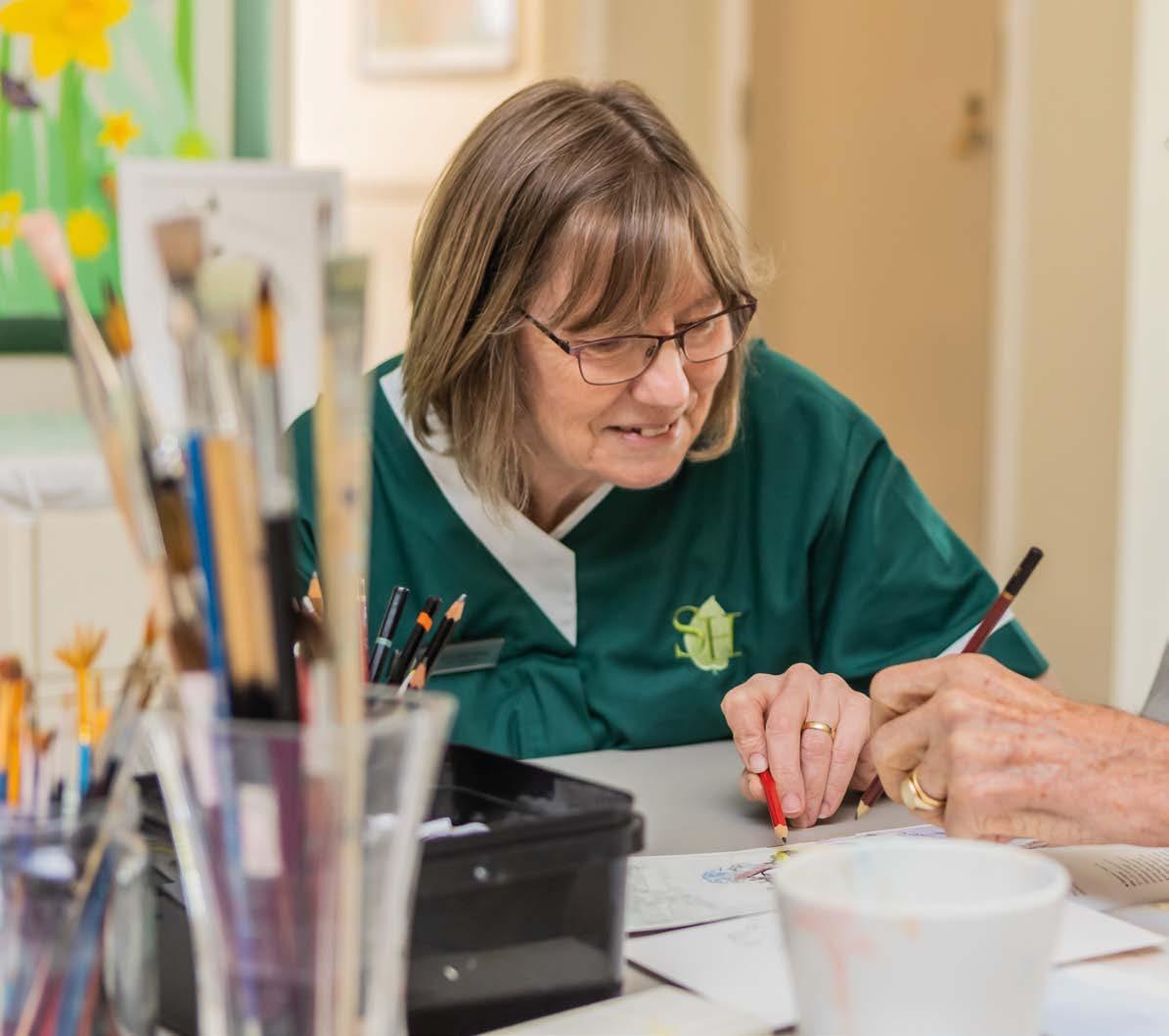
“That stuff is really meaningful to me because it’s very easy when you are at the
“As
leaders we have to take time to step away from our desks even when we don’t have time, because if we lose sight of why we are doing what we are doing that leads us to losing what makes us special.”
top of an organisation to be disengaged from what’s happening on the floor.”
In another example, French highlights a conversation with a resident’s family who had been amazed with the progress in their father’s health since moving into his care home in just two months.
“They told me he has been confined to a wheelchair but now he was walking around the garden 10 times a day to get himself back on his feet,” French recounts. “This is the stuff that’s really important and what helps us build case studies of our homes and put forward awards nominations. You can tell the difference between stories that have been put together by a marketing department and those that have been put together by people who know it because they have seen it.”
Stepping up to the plate French, who is also a non-executive director of The Outstanding Society, says she has become increasingly confident at representing social care at a national level by being a spokesperson on key issues.
She recently published an article in Caring Times calling on the government to revisit its ban on overseas care worker dependants, which came into force on 11 March.
“It’s been really important to speak out about it,” French says. “I think it’s really important that more of us step up to the plate and get our voices out there in the media and I am really happy to do that now.”
Stow Healthcare has slashed its vacancies from 45 to eight since the
12 | APRIL 2024 CARING-TIMES.CO.UK >

beginning of 2023 thanks to the successful recruitment of overseas workers from a range of countries. This equates to a vacancy rate of only 1.3% across the group currently.
“It’s been a really positive story for us and some of our overseas workers’ dependants now work for us also, so in essence it's buy one get one free,” French says. “That’s something that I don’t think the government has sufficiently taken into account. It’s a knee-jerk reaction in an election year and unfortunately people in social care are likely to be the ones who suffer from that decision.”
Taking risks
Looking ahead, French says social care needs to be far better at “letting people live their lives and take risks”.
“We as providers have become very scared,” she stresses. “We are scared of what regulators and safeguarding will say if things go wrong. We have to be much more upfront about managing people’s risks in a really proactive way that supports them to have a reason to get out of bed each day.
“We have to get a lot braver about
“I think it’s really important that more of us step up to the plate and get our voices out there in the media and I am really happy to do that now.”
stepping forward and enabling people to take risks and evidencing the positive impact that has had on their lives, whether it’s someone learning to do their own ironing or learning to shave themselves once again or being able to put their banana bread in the oven or make themselves a cup of tea.
“These are the small things that you take for granted in your own home and it feels like we take all of that away from them when they move into care because we are scared and this is something we need to get over and that’s what the new era of social care needs to look like.”

CARING-TIMES.CO.UK APRIL 2024 | 13 leader’s spotlight | business
Halstead Hall Care House
The overseas licence debate
Bridgehead Social Care’s managing director William Walter interviews Alison Thewliss, shadow SNP spokesperson for home affairs, and Lia Nici, Conservative MP for Great Grimsby, regarding the ban on care workers’ dependants and the implications of immigration restrictions on staffing in the sector
What are your views on the government's ban regarding care workers' dependants which a member of the BMA described as "unnecessarily cruel"?
Alison Thewliss: I would entirely agree with the BMA position. I think it’s most cruel to say that somebody should come from abroad to look after our loved ones but can’t bring their own. It will also dissuade people from coming because they don’t want to choose between their own family and coming to the UK. So, I think it’s going to have a severe impact on the ability of firms who can’t get that labour and on people who need care, who won’t be able to get somebody to look after them.
Lia Nici: People from abroad who bring their expertise play an important role and it is right to recognise this. However, our reliance on foreign workers is a stopgap and a symptom of a wider issue. Over 10 million working age adults in the UK are not in employment or training. We need to work towards getting Britons into work and ending our reliance on imported labour and a system that allows unemployed dependants to disproportionately put pressure on public services. This current situation causes other countries to suffer a brain drain across their healthcare systems, which is unacceptable and unsustainable. We
"Our response to modern slavery should be to tackle it wherever it occurs and not to bend to the criminal gangs who run these rackets."

need to address the fundamental issues that have led us to rely so heavily on foreign workers, who could benefit their own societies as much as they benefit ours, while ensuring Britons are given the opportunity to work and contribute.
With at least 800 potential victims of modern slavery found in social care last year, do you believe further action is necessary to reduce exploitation?
Alison Thewliss: People have been able to come into this market to exploit people, and those within the system have been quite vulnerable. It’s incredibly challenging to speak out against those guaranteeing your visa, and should you do that, you have very little recourse to remain here.
So, this is a system both in care and other sectors like agriculture, where people have found themselves being exploited, and the UK government hasn’t asked enough questions of the employers that are doing this in the first place. There should be far more stringent checks on these companies, and the government should be more robust in dealing with this abuse. The people at the heart of this should not lose out; they have been victims of exploitation and should be supported.

Lia Nici: Modern slavery is a shocking crime, and I am proud of what the government has done to tackle it. The Modern Slavery Act 2015 has transformed our response, significantly increasing law enforcement activity against the criminals behind this. Since 2016, £15 million has been invested to strengthen the police response through the Modern Slavery and Organised Immigration Crime Programme. This has also driven improvements in the police's understanding of modern slavery and built new capabilities to combat organised immigration crime. Prosecutions have increased: in 2021, 466 individuals were prosecuted for modern slavery crimes, with more than 70% convicted. Our response to modern slavery should be to tackle it wherever it occurs and not to bend to the criminal gangs who run these rackets.
How would you address concerns that lower immigration could result in further understaffing?
Alison Thewliss: The Migration Advisory Committee (MAC) observed that Scotland is less reliant on migrant labour in the sector because of higher wages for people coming into social care compared to other professions
business | politics & policy 14 | APRIL 2024 CARING-TIMES.CO.UK
Lia Nici Alison Thewliss

"At the moment, you can work in a supermarket with far less responsibility and better hours than in a care home, so naturally people do that.”
that people might go to. Consequently, they can attract people and be less reliant on migrant labour. The MAC recommended to the UK government that what’s missing is a policy whereby people in health and social care are given a good wage and a clear means of progressing. At the moment, you can work in a supermarket with far less responsibility and better hours than in a care home, so naturally people do that. I think it’s a strong recommendation, which would reduce the need for migrant labour and attract more people into the sector.
Lia Nici: Creating effective educational and vocational pathways for young people in the UK is an important
measure we need to take to support our social care services. As someone with 22 years of experience as an educator, I know the value that practical experience and professional support can have for young people considering their careers. It’s crucial that we champion vital sectors of our healthcare system, such as social care, as places where young adults and those starting out in their careers can make a real impact and learn important skills which will support them through life.
Can more accessible paths like apprenticeships replace the need for foreign labour?
Alison Thewliss:We need to encourage more young people to see this as a promising career for them and an area where they can have a rewarding career over many years. I think more people should recognise the incredibly tough work that is done in this field. I would very much encourage apprenticeships, but these need to be properly paid too, because if firms are only paying the apprenticeship minimum wage, that makes it very difficult for people to come into that role and fulfil those difficult hours and demanding tasks that are being asked of them. So there needs to be a recognition of people's
responsibilities, and yes, apprenticeships are a good route, but they should be fairly paid.
Lia Nici: This is exactly the route that I’m championing in Parliament. A couple of weeks ago, I presented my proposal for a policy that would directly tackle skills shortages in our public sector. I suggested that students be given the opportunity to study quality, accredited courses which directly relate to the skills we need in our NHS and other services, rewarding those who sign up to help our country by writing off their student loans. I believe that we need to address skills shortages by investing in our young people, by providing them with easier access to high-quality courses which will give them the ‘hard’ and ‘soft’ skills they need to succeed.
"So there needs to be a recognition of people's responsibilities, and yes, apprenticeships are a good route, but they should be fairly paid.”
CARING-TIMES.CO.UK APRIL 2024 | 15
People unprepared for later-life care
More people are prepared for their own funeral than for their later-life care, a new survey reveals
An Opinium survey of 2,000 adults commissioned by Loveday found that only 14% of respondents were prepared for their later-life care, compared with 28% who were prepared for their funeral arrangements.
Only 22% felt ready to handle a care crisis for a loved one or dependant. Planning for later life didn’t differ by age, with the over 55s feeling as unprepared as the 18 to 34s, with 83% of both age groups admitting they were
"Two-thirds (33%) admitted they would feel guilty about putting a loved one in care and one in 10 worried about how to bring up the subject of care with a loved one."
unprepared for later-life care, and 90% of 34 to 55s feeling unprepared.
Darren Pitcher, care and quality director at Loveday, said: “Even having a brief plan can be immensely beneficial during a care crisis. A quick search on the CQC website can pinpoint care providers in your vicinity and many providers also offer respite care, allowing you time to make more informed long-term decisions. This straightforward process ensures peace of mind, providing a clear direction in case urgent care is needed.”
In further findings, 83% of respondents expressed concerns about placing a loved one or dependent into care, 61% worried about quality of care and 49% were apprehensive about the financial implications of care.
Two-thirds (33%) admitted they would feel guilty about putting a loved one in care and one in 10 worried about how to bring up the subject of care with a loved one.
Around one-third (32%) believed the quality of care homes in the UK was poor, while only 18% considered
it good. Only half of the surveyed individuals (50%) deemed care homes to be adequate, despite over fourfifths of care homes being rated Good or Outstanding by the Care Quality Commission.
93% of respondents feared the ageing process, with top concerns including declining health (61%) and dementia and loss of mobility (both 55%). Women (63%) were more worried about dementia than men (48%). Nearly half (48%) were anxious about losing independence and 43% feared the passing away of friends.
Under a quarter (24%) claimed to be knowledgeable about the process of arranging care and more than a third (36%) admitted they wouldn't know where to start when considering laterlife care.
Common first steps contemplated included online research (25%), contacting the GP (22%) and seeking advice from friends and/or family (17%), with only 14% thinking of going to social services, 8% to the council and 3% to a charity for information first.

16 | APRIL 2024 CARING-TIMES.CO.UK business | surveys & data
Reform required
Older people’s right to liberty is not being protected in care homes and change is needed, says Age UK
The right to liberty of older people with diminished capacity in care homes is in complete disarray and in urgent need of reform, according to a new report.
Age UK’s ‘Hidden crisis’ report says almost 50,000 older people have died without proper legal safeguards in place and more 100,000 cases are awaiting authorisation.
Caroline Abrahams, Age UK charity director, said: “Personal liberty is part of our birthright and central to our understanding of what it means to live in a democracy, so it is profoundly shocking that so many older people with diminished capacity are living and dying without the proper legal protections for limiting their freedoms being in place.”
Abrahams warned of the “nightmare scenario” where older people are locked in their care home against their best interests.
She said Age UK had heard of cases where a care home was reluctant to constrain the movements of an older person who is at risk, without legal authorisation.
The charity said the Deprivation of Liberty Safeguards (DoLS) process, which provides a set of checks to ensure that the deprivation of liberty is in the person’s best interests, was not working well in practice and for an alarming number of older people was not
"Abrahams warned of the 'nightmare scenario' where older people are locked in their care home against their best interests."
working at all.
The report highlighted significant criticism of DoLS since their introduction in 2009 noting a 2014 House of Lords report which concluded they were “not fit for purpose”. It also highlighted widespread lack of Mental Capacity Act knowledge among care professionals, including a lack of training and inadequate support for individuals or families who want to challenge DoLS decisions.
Age UK also noted the government’s failure to introduce replacement Liberty Protection Safeguards legislation which was set out in the Mental Capacity (Amendment) Act 2019.
Abrahams added: “The failure of successive governments to grasp the nettle of ensuring there’s a functioning system for safeguarding older people’s liberty if they lose their mental capacity is symptomatic of their broader failure to reform and refinance social care.
“At Age UK we support reform of the current system, via the replacement scheme the government proposed a few years ago but then subsequently shelved – provided it delivers effective human rights protections for older people. In the meantime, we believe it is essential that the government properly funds the system that is in place, until reform

can happen. It should also give local authorities the resources to begin to tackle the backlog.”
"The report highlighted significant criticism of DoLS since their introduction in 2009."

CARING-TIMES.CO.UK APRIL 2024 | 17 surveys & data | business
Local authorities in England: Estimated uncompleted DoLS applications by year end (Source: NHS Digital)
Caroline Abrahams
business | sustainability matters
Good neighbours become good friends
Quality director Nicky Barnes explains how Hartford Care fulfils its commitment to connecting with communities
We are extremely proud of our close ties within our communities; we are committed to ensuring that our homes are actively engaged with their neighbours, and with the people who live and work in the villages and towns where we are located.
Our commitment to community outreach interlinks with our company ethos of ‘creating caring communities’; our philosophy of care is underpinned by creating places that are friendly, kind and welcoming of everyone, caring for each other and celebrating individuality by recognising that everyone needs something different to thrive – and this isn’t just pertinent to the community inside our care homes, but our wider neighbourhoods too.
We connect to communities by inviting people into our homes, donating to local charities, supporting food banks and sponsoring local initiatives. Most recently, we hosted an open house event, where people could take a tour and meet our teams. We often link events in our homes to calendar events such as Shrove Tuesday when we invited people along for pancakes and Blue Monday to ensure people didn’t have to spend the day alone.
“We connect to communities by inviting people into our homes, donating to local charities, supporting food banks and sponsoring local initiatives.”
It's incredibly important to remember the majority of our residents continue to reside in the same places where they’ve previously lived, so if they were a part of the community before, then they still should be now. Our residents generally like a busy, vibrant community and we offer a range of different activities and events in our homes, such as visits from local nurseries, visiting entertainers and friendship groups, meaning people can decide on what they’d like to take part in for themselves, and there’s truly something for everyone.
We enjoy getting out and about and supporting local causes and in December we shared a £5,000 charity donation between our homes and central office, each choosing a charity of their choice. We also support a set charity which changes every few years, via a staff vote, so it’s a collaborative approach. Following the most recent vote, we’re currently supporting Shelter.
We help our residents to support their chosen charities. Last year, Marguerite, a resident at The Elms in Bembridge, completed a six-mile walk to raise money for the Isle of Wight Mencap, supporting people with learning disabilities.
We want to be able to help those less fortunate in our localities and beyond, and many of our homes regularly donate to local food banks. Alongside this, last year many homes provided a base for donations for Ukraine. Sponsorship is also a big factor, and we support many local initiatives, such as Maidenhead FC youth team.
The response to everything we do is extremely positive. Local NHS workers were very grateful to be recognised when we invited them to our homes for a New Year’s lunch. Our residents and their families particularly appreciated being invited to spend Christmas lunch together, with free
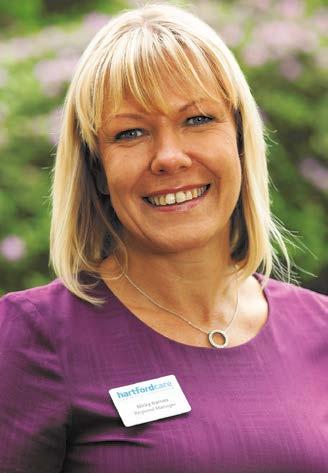
“We want to be
able to help those less fortunate in our localities
and beyond, and many of our homes regularly donate to local food banks.”
meals for family members.
The most recent shining example that our hard work in the community is paying off occurred at West Cliff Hall in Hythe. The home had a water outage for around 72 hours, so we posted on a local Facebook group and many local people came along and dropped off water supplies for our residents and kept us going throughout – we’re incredibly grateful. Most of all, we’re proud to continually bring people together.
Nicky Barnes
18 | APRIL 2024 CARING-TIMES.CO.UK
It’s still the ecology, stupid!
Jonathan Freeman, group sustainability director at CareTech Group, looks at how social care is rising to the challenge of reducing greenhouse emissions
When my first Sustainability Matters column appeared in the December 2022 issue – ‘It’s the ecology, stupid!’ – United Nations secretary-general Antonio Guterres was warning world leaders at the COP27 meeting on climate change that “we are on a highway to climate hell with our foot on the accelerator” and that the world was in the “fight of our lives and we are losing”. I made the simple comment in that article that the social care sector had to be in that fight – whether we like it or not.
So, how’s that fight going? Hmmm…
A quick glance at the latest climate change news is sobering:
• February 2024 was the world's warmest February in modern times, 1.77C warmer than ‘pre-industrial’ times, with the first year-long breach of the 1.5C cap on temperature increases to which world leaders committed in the 2015 Paris Climate Change Agreement.
• Sea temperatures are now so high that scientists are predicting that the world’s coral reefs are on the brink of the “worst bleaching event in the history of the planet”.
• Antarctic sea-ice has reached extreme lows and new research shows how the melting of the ice caps is directly triggering extreme weather events worldwide.
• Carbon dioxide levels are at their highest for two million years, with the annual Global Carbon Budget reporting total global CO2 emissions of 40.9 billion tonnes last year.
"The case for urgent and significant action to address man-made climate change remains as strong as ever."
It’s not a pretty picture, is it? The case for urgent and significant action to address man-made climate change remains as strong as ever. This is not an issue that we can afford to kick into the long grass or put in the ‘too difficult’ pile.
The upside is that we now understand far better the causes and effect of climate change and –vitally – what we need to do to turn things around. We are not helpless bystanders. We have the capabilities and knowledge to sort this problem out together.
Commitment to change is growing:
• Last year, solar panels were installed in 17,000 UK houses every month.
• Electric vehicles accounted for 18% of new vehicle sales worldwide in 2023.
• COP28 saw world leaders, finally, acknowledging the need to transition away from fossil fuels for energy production.
Bringing this closer to home, the social care sector increasingly stepped up to the plate on these issues –and there are many great examples of operators and partners taking important action:
• In last month’s Caring Times, Hartford Care’s Nicky Barnes set out the fantastic work her company has undertaken, including installing solar panels in 11 services, with some 30% of the electricity for these homes now coming from solar.
• Oakland Care has planted hundreds of trees, created wildlife gardens, and undertaken countless other activities to boost biodiversity, reduce waste, and offset long-term emissions, with chief executive Joanne Balmer being recognised with an ESG champion award for her endeavours.
• The simple-but-brilliant Grace Cares is now providing a service to collect, donate and sell second-hand care equipment, providing access to less expensive equipment and promoting sustainability through its zero-tolandfill policy.

"At CareTech, our switch to a green electric tariff has resulted in a 30% reduction in our direct carbon emissions."
• At CareTech, our switch to a green electric tariff has resulted in a 30% reduction in our direct carbon emissions. And our Smartbox business has radically redesigned all of the packaging materials for its assistive communications technology devices, reducing carbon emissions by a staggering 72%.
These are not isolated examples of change. Recently, a colleague argued against hosting an event focused on sustainability because “I think the sector gets the importance of ESG now.” At the Social Care Sustainability Alliance, we have certainly seen an increasing number of providers signing up and with our discussions focused on how to drive action and tackle tricky issues.
Of course, there’s so much more that needs to be done. but the commitment to collaborative action across the sector fills me with huge confidence that, yet again, the social care sector is very much up to the challenge.
CARING-TIMES.CO.UK APRIL 2024 | 19 sustainability matters | business
Jonathan Freeman
Property news

Healthcare real estate fund Elevation Healthcare Properties has acquired from Clariane 11 properties and simultaneously leased them back to Berkley Care Group on inflation-linked, longterm leases. The total consideration to Clariane was £207 million. Berkley Care operates 12 modern care homes across England comprising 805 beds.

Rented retirement homes provider Birchgrove and Hybr, a student letting platform, are developing an intergenerational living scheme which will see retirees living in the same purposebuilt, privately rented retirement development as students and key workers. Ayrton House is a new £36 million 60-apartment rental retirement community in Mill Hill, North London. When launched in October this year, 16 apartments across the third and fourth floors will be offered exclusively to trainee doctors and nurses from the local hospital, university postgraduates and graduate scheme students.
Hallmark Luxury Care Homes opened a £23 million 80-bed residential, dementia and nursing home in Bath. Midford Manor features a cinema, café, hair salon and gym supported by an

in-house physiotherapist. Other features at the home include a sensory room to support residents living with dementia, a craft room, and celebrations area which will be used for family gatherings and special events.

20 | APRIL 2024 CARING-TIMES.CO.UK business | real estate & development
Berkley Care Group's Fernhill House
Ayrton House
Midford House
Lovett Care's Kings Hill site
Lovett Care purchased a site from property developer Aspire at Kings Hill, Kent to build a care home on the former West Malling airfield which was used in the two World Wars. Occupying a site close to village amenities, the 1.8-acre development has full planning permission for a 78-bed home with wet rooms and communal resident facilities, set within landscaped gardens.
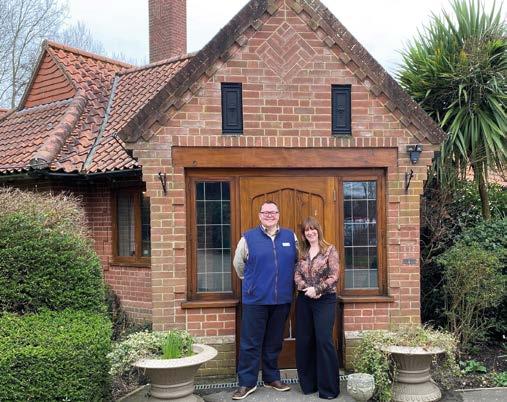
Not-for-profit care provider Greensleeves Care acquired Broadacres, a residential care home in Barton Turf, Norfolk. Independently owned Broadacres has been in operation as a care home for nearly 40 years with capacity for 28 residents, The property was converted from a private residence in 1986 and subsequently extended, today featuring 25 large bedrooms with full en suite facilities, communal spaces and landscaped gardens.
LNT Care Developments purchased a 66-bedroom care home

site in St Andrews Park Halling, Kent from property developer Aspire for £2.88 million. Commercial real estate firm Colliers negotiated the deal. Planning permission was secured for the development of a three-storey care home complete with en suite wet rooms. LNT expects to hand over to its operating partner and welcome residents by the first quarter of next year.
Real estate investor and lender Octopus Real Estate provided £35 million for three new care homes in the Octopus Healthcare Fund’s portfolio. The homes will provide more than 200 beds, funded as part of a partnership with family-owned care home group Acacia Care. Two of the homes are recent acquisitions by the Fund. Both are currently being constructed by Synergy Care Developments, at sites in New Lubbesthorpe, Leicestershire, and Hunstanton, Norfolk. Both developments are due to complete next year, when Acacia Care will operate each home on a longterm lease.

CARING-TIMES.CO.UK APRIL 2024 | 21
| business
real estate & development
Broadacres
CGI of one of the three new Octopus care homes to be run by Acacia Care
CGI of LNT's St Andrews Park Halling site
Women at the top
Caring Times speaks to four key executives at new care provider, Aria Care, which is championing female leadership
According to the World Health Organization, women account for 70% of the global health and social care workforce, but the picture is not always mirrored at the leadership level, with only 25% female representation in senior positions. The reasons are multifaceted, but this unfortunately leads to a loss of talent which is damaging for the industry.
There are four women in the senior leadership team at Aria Care, a new 50-home care provider, who shared their thoughts about creating a working environment that is conducive to empowering women to progress in their careers.
Cultural transformation
When Aria Care was formed in December 2022, Caroline Roberts, with more than 35 years’ experience working in the sector, was appointed chief executive. Roberts says she has a vision for Aria Care to be the best provider of care in the UK, and a central part of this has been putting equal opportunity front and centre to ensure all 2,700 employees are treated fairly, equally and with respect.
Female leadership can have a transformative effect on organisational culture, and is often conducive to
"According to the World Health Organization, women account for 70% of the global health and social care workforce, but the picture is not always mirrored at the leadership level, with only 25% female representation in senior positions."

improved outcomes for women, such as increased visibility and a better work-life balance. Beyond improving pay rates, enhancing benefits and annual leave, and becoming a living wage employer, Roberts says she has fostered a culture of enablement which has created a feeling of trust where all staff feel empowered and listened to. Roberts has also taken a hands-on approach, and her engagement within Aria’s communities has made her a strong female role model, which has been inspiring at all levels.
Upward mobility for women
Visible upward mobility is crucial to achieving gender equality and can play a key part in ensuring employees remain engaged and happy in their roles. Kelly Howell, Aria’s chief people officer, Ruth Yates, managing director of operations, and Sarah Chapman, director of sales and marketing, have all been promoted internally to their current positions as part of Aria Care’s executive team. The company has achieved complete gender parity within its senior leadership team, which has 50% female representation, and Roberts says it is constantly creating career pathways and
development opportunities to give all of its employees the chance to progress.
Giving everyone a voice
Roberts says gender equality can only be achieved within an organisation that is truly representative of the views of all members and this is why the company brought staff at all levels together at its annual conference to ensure the company’s new vision was reflective of the employees’ own values.
Roberts says she values the need for organisations to be inclusive and she is proud that its gender pay gap is currently 2.3% across the organisation, significantly below an Office for National Statistics report in 2022 that put the UK average gender pay gap at 8.3% (median).
Roberts says she will continue the drive to eradicate gender inequality by living the company’s values each day and applying these to decisionmaking. Also, collaborating with other effective women in the sector enables Aria’s senior women to work together, not only recognise and reward female talent, but to create a more balanced representation in the industry.
business | leadership 22 | APRIL 2024 CARING-TIMES.CO.UK
Caroline Roberts
Ruth Yates
Kelly Howell
Sarah Chapman



People moves
BKR Care Consultancy appointed Charlie Jones as chief operating officer after working for the company for 10 years. Jones began her career as a haematology nurse and worked in a blood and bone marrow transplant unit. Between 2013 and 2014 she worked in a care home before joining BKRCC where she had provided training services to BKRCC clients while working at her previous job.

New Care’s Grosvenor Manor Care Centre promoted two of its most experienced and long-serving employees. The home provides 24-hour nursing care, residential, respite and dementia care. Carer Darren Molyneux has been appointed deputy home manager and nurse Maria Zolotnikova has been appointed as clinical lead. Each has more than 17 years’ experience in health and social care and have worked at Grosvenor Manor for more than five years.

Anchor, a not-for-profit provider of older people’s housing and care, appointed Julia Mixter as executive director, business services, effective 13 May. Mixter replaces Kate Smith, who left Anchor to become chief executive at rural housing group Connexus.
Friends of the Elderly Malvern appointed Jo Bennett as general manager. The charity comprises residential, nursing and dementia
in association with


care homes, Davenham, Perrins House and Bradbury Court. Bennett has worked in the care sector for more than 16 years.

Nursing and care recruitment agency Nurseplus appointed Ian Hobbs as chief operating officer. Hobbs has 25 years’ experience of the staffing industry. He is a mechanical engineer by trade, having formerly trained with the Ministry of Defence for five years, followed by 10 years in the financial services market before moving into the staffing industry.

business | personnel 24 | APRIL 2024 CARING-TIMES.CO.UK
Charlie Jones
Darren Moyneux and Maria Zolotnikova
Julia Mixter
Jo Bennett
Ian Hobbs
London-based luxury home care service Vivant employed eight experienced personal assistants who, between them, have wideranging experiences and backgrounds. The new arrivals include a former English teacher, a science PhD, a yoga teacher, a musician, a paramedic, as well as nurses. Vivant launched in January, aiming to enable its clients to continue living at home. The company’s offering includes an exclusive concierge service, personalised, tailored care support, and companionship.
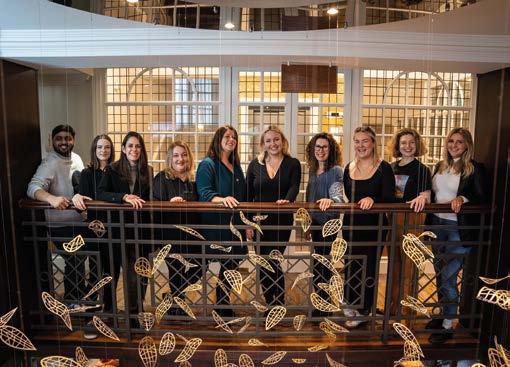
Morris Care Centre, a 96-bed nursing home in Wellington, Shropshire appointed Stacie Smith as its new home manager, leading more than 130 employees providing a range of care including complex disability care for residents of all ages, and respite, convalescence, palliative and dementia care for older people. Smith’s career in care started as a care home assistant and she worked her way up to become a deputy manager, a manager and then an area manager across seven homes.

Parklands Care Homes boosted its Highlands management team with three new appointments. Mel Oliver was appointed as deputy manager of Innis Mhor in Tain, while Alexis Le Neven was recruited as manager of Eilean Dubh in Fortrose. Alana Brown, previously a shift leader at Eilean Dubh, has also joined Parklands’ training and development team as a trainer in the region.




personnel | business CARING-TIMES.CO.UK APRIL 2024 | 25 Birmingham, Northampton & Market Harborough Email us at charlotte.macfarlane@catolex.law to arrange your initial telephone consultation 0121 387 4410 catolex.law Reliable, clear advice on what to do and why Specialist in the Care Sector 38 years of experience in Conflict Resolution Owner of a care company with 90+ employees John Cato Solicitor-Advocate Reshaping The Business Of Law
Vivant Stacie Smith
Mel Oliver (left), deputy manager of Innis Mhor, with manager Kate Walker
Is one word enough?
Healthcare regulatory partner Amanda Narkiewicz from law firm Mills & Reeve considers the Care Quality Commission’s response to recent reports following the death of head teacher Ruth Perry
The Care Quality Commission has confirmed it will learn lessons from the death of Caversham Primary School head teacher, Ruth Perry, who took her own life after an Ofsted inspection, and is overhauling its training of inspectors. The regulator plans to roll out a training programme designed to support assessors and inspectors and identify signs when providers may be distressed.
In its February board report, the CQC considered what it has learned from recent reports following the death of Perry, as comparisons have been drawn with its work and the CQC’s use of ratings to describe quality.
Interestingly, the CQC makes the point that the quality of care provided by large healthcare settings is not usually perceived as the sole ‘responsibility’ of an individual in a comparable way: we expect registered managers may take a different view.
The regulator acknowledges it has had contact from providers and provider representatives to highlight the stress of inspections and pressure they experience on the ground, and the effect of this on wellbeing and longterm recruitment.
In addition to reviewing the training of inspectors and assessors, the CQC recognises there are “further areas” where it “must act”.
"The roll-out of the CQC’s SAF and its aspiration to be a ‘dynamic regulator’ should mean that in future ratings are updated in a timely way once concerns have been remedied."
Key areas include:
• A review of quality assurance processes to ensure reports are published in a timely way, such that “where there has been an unusually long delay between inspection of a service and publication of a report, consideration will be given to how any progress made since the inspection is reflected in any accompanying media materials at the point of publication to ensure an upto-date picture of quality”.
• Further guidance for providers to support them with the new Single Assessment Framework (SAF), as the CQC recognises that it is a transition from an old model to a new model with new technology.
• A review of the process for supporting the wellbeing of providers.
• A review of other pathways for providers to raise concerns with the CQC which cannot be resolved by assessors and inspectors on site.
• Reassessment of the call for an independent complaints process. However, the CQC emphasises that if providers are unhappy with the CQC’s complaints process they have the right to contact the Parliamentary and Health Service Ombudsman via their local MP. This is a live issue for care home providers who have been calling for an improved pathway for complaints.
Ofsted learning
Senior coroner Heidi Connor raises concerns in her ‘Preventing future deaths’ report that the current Ofsted system allows for the single-word judgement of Inadequate to be applied equally to a school failing in all areas and to a school rated otherwise Good, but with issues that could be remedied by the time the report is published.
Care providers’ ratings, similarly, can at times be dictated by a small number of findings that can be remedied quickly

"The impact of an Inadequate rating, particularly for care providers, cannot be underestimated."
and before the publication of the CQC’s rating.
The roll-out of the CQC’s SAF and its aspiration to be a ‘dynamic regulator’ should mean that in future ratings are updated in a timely way once concerns have been remedied. However, it will also mean that the CQC will be quicker to downgrade ratings and take enforcement action.
The impact of an Inadequate rating, particularly for care providers, cannot be underestimated. That one-word rating can often trigger enforcement action, a financially distressing local authority embargo (preventing new admissions), adverse local press, difficulty in recruitment and retention of staff, and home managers feeling exposed to public scrutiny from residents, their families and the local community. All of this in our experience impacts a provider’s ability to address the concerns that led to the rating.
26 | APRIL 2024 CARING-TIMES.CO.UK business | legal and regulatory
Amanda Narkiewicz




Handle with care
Luke Mitchell, a solicitor in the health and social care team at RWK Goodman, says providers must be fastidious with data requests and only disclose information to those who have authority to access it
Health and social care providers are often met with requests for records from either service users or their relatives. The consequences for providers of getting this wrong can be serious.
Types of requests
There are several pieces of legalisation under which records can be requested. This includes:
• The UK General Data Protection Regulation (GDPR) – which entitles individuals to request their own personal data. This is referred to as a subject access request (SAR).
• Access to Health Records Act 1990 –this applies to people who have died. Health records can be requested from a patient’s personal representative or someone who has a claim resulting from a patient’s death.
• Freedom of Information Act 2000 – which creates a general right of access to recorded information held by public authorities. Crucially, this is unlikely to apply to most social care providers, in contrast to the NHS, and GPs and dentists holding NHS records.
What to do when a request is received
When receiving a request, providers should first identify the type of request being made. This will determine what authority documentation is required and the time frame for responding. The following steps are key:
• Put in place a comprehensive policy detailing what to do when a data request is received and who within the organisation data requests should be escalated to. There should be more than one person to allow for absences.
• If the request is unclear, seek clarification about what data is sought. This may narrow the scope of the request, thereby avoiding disclosure of irrelevant material and an unnecessary
administrative burden.
• Identify the type of request and the deadline for complying.
• Ensure staff are adequately trained to identify record requests and what action to take in accordance with providers’ policies. Requests should be referred to the relevant people as soon as possible to maximise time to collate data and respond.
• Redact documents that contain third-party data. This could include the name of other service users, for example, or sections of documents which are not relevant to the record request.
• Ensure any records are disclosed securely, for example using a secure file sharing platform or by using password protected files. This is particularly important for social care providers which typically hold large amounts of special category data.
The consequences of getting it wrong
If you disclose confidential data to an individual without authority, this is likely to result in a data breach which could then be subject to investigation by, or a sanction from, the Information Commissioners Office (ICO).
The ICO has various enforcement powers ranging from the issuing of a warning to a fine of up to £17.5 million or 4% of annual turnover, whichever is higher. The impact of this on providers could be catastrophic for its bottom line, particularly with existing financial pressures in the sector.
Providers should also keep in mind Regulation 17 of the Health and Social Care Act 2008 (Regulated Activities) Regulations 2014 (good governance) which requires providers to observe data protection legislation. A breach of the regulations could limit overall service ratings determined by the Care Quality Commission.
Moreover, where confidential

"Providers may also find that a data breach causes reputational harm, as well as increasing its insurance premiums."
information or personal data is inadvertently shared, the individual concerned, or his or her attorneys/ personal representatives, may seek to instruct a claims management company (CMC) to pursue providers in the courts for compensation.
When instructing a CMC there are usually no legal fees to pay if the company is unsuccessful in obtaining a court decision or settlement in the person’s favour. CMCs are therefore heavily motivated to get providers to pay. Regardless of the merit of any claim, providers will spend a significant amount of time and money fighting a claim.
Providers may also find that a data breach causes reputational harm, as well as increasing its insurance premiums.
Having good systems and policies in place and taking advice at the outset will greatly reduce the risk of getting things wrong.
28 | APRIL 2024 CARING-TIMES.CO.UK business | legal and regulatory
Luke Mitchell




care
33 CPD
Skills for Care discusses how the new care reform package can offer personal advancement
34 CT ON THE ROAD
Care England's conference champions social care
44 WELLBEING
Dr Zoe Wyrko offers a fresh take on later living
39 CARE FOR TOMORROW
Meet Alfred – your friendly robotic waiter
Managers’ guide to… hydration
An innovative approach is key when it comes to keeping care home residents hydrated, says Danielle Barham, manager at Weald Hall Care Home in Epping, Essex
With the elderly, good nutrition and hydration play a vital role in keeping their health where we want it to be. Older people are particularly vulnerable to developing dehydration due to issues such as a deterioration in kidney function and swallowing problems, while people living with dementia often don’t know they are thirsty and need reminding to drink.
Hydration care in care homes can be challenging, with many residents dependent on staff to provide them with drinks. The consequences of dehydration in older people can be severe, and can include delirium, falls, constipation and urinary tract infections. That’s why it’s important for a care home manager to stay on top of hydration policy and practice. Our home is not just a care home, it’s a place to carry on living with a little extra support.
1. Innovate to hydrate. Doing something a bit different can be a good way to promote the importance of hydration and bring it to the front of the minds of residents, staff and families. At Weald Hall Care Home we recently hosted a Mad Hatters’ Tea Party with a focus on promoting nutrition and hydration, but also fun. It was organised by our lifestyle team, and we took a creative approach to catering, using the opportunity to show how food can contribute to hydration. We had teapots
made from melons, for example, jellies made in rabbit shaped moulds, soup in tea cups and yoghurts in little shot glasses. We made all the food and drink ourselves using Instagram for inspiration and we invited our local mayor who gave a speech about the importance of hydration and nutrition.
2. Small is beautiful We use smaller cups as we find this works better. Residents will often look at a large cup and say “I can’t drink all that”, but will drink the same amount from a small cup which is topped up regularly.
3. Hydration can come from food as well as drink We offer jelly shots, for example, and we had a cake made out of fruit at our Mad Hatters’ Tea Party.
4. Make it fun We put different flavoured drinks in transparent coloured cups, to disguise the colour of the drink, and asked residents to guess what flavour the drink is.
5. Make sure people understand what’s on offer If you offer people living with dementia a choice of drinks, they will often just repeat the first thing you said. Try showing pictures of different drinks instead.
6. Record preferences. Care plans should include food and drink preferences and dislikes, as well as allergies. All staff need to have access to the care plans, because all staff will be involved in offering drinks at some point. Residents’ needs can change, so


make sure they are frequently assessed to ensure they receive the correct level of support.
7. Be a role model If we notice someone isn’t drinking, it can help to sit with them and have tea or juice yourself. Some residents are not great eaters, but if you sit with them they will probably eat, even if they are eating your lunch instead of their own.
8. Give plenty of opportunities to hydrate We put juice in residents’ rooms every morning, even if we know they are not going to be in their rooms – they might go back. We refresh it every afternoon and evening. Hydration stations in corridors should be filled up at all times.
9. Get residents involved Engaging people in making smoothies and milkshakes encourages them to drink. As a manager, you need to be out on the floor as much as you need to be doing paperwork, talking to residents and finding out what they want. We come up with ideas by talking to people.
10. Audit your own practice. Ask yourself and your team – can all residents ask staff for drinks, and if not how do they get them? What help is given to residents who need to be supported to drink? How do you know that all residents are getting enough to drink?
30 | APRIL 2024 CARING-TIMES.CO.UK care | registered managers
Chef of the month

Tell us about your background in care
I was born and raised in Mumbai, India, and was always determined to follow in my father's footsteps in the catering industry. My father manages a restaurant of his own in Mumbai, which gave me the opportunity to inherit culinary skills from a very young age.
While living in Mumbai, I worked at five-star The Oberoi Hotel. I wanted to challenge myself and learn from some of the best in the industry.
In February 2021, I decided to travel to England and study for my master’s degree in hospitality at the University of Birmingham. I then managed to secure a role at The Ivy in Birmingham, where I worked alongside a team of 42 highly skilled chefs who taught me about modern brasserie classics, Asianinspired cuisine, and delicious vegan and vegetarian options.
I loved my time at the Ivy, but I thought my skills could be utilised better in a different setting. I took a leap of faith and applied for the head chef role at Sherrell House Care Home. Looking back, I am so glad I made this decision.
What is special about working at Excelcare?
As soon as I joined Excelcare I was made to feel special, with training opportunities offered to me within the first few months. Being an introvert and someone who doesn’t regularly engage with people I don’t know, I found this changed when I came to Sherrell House. The support from the home manager gave me confidence to step out of my shell and engage with the people who live here. Now, I actively visit different suites in the home, get feedback from people about the food I make, and ask for suggestions to incorporate on our menu.
It’s a very rewarding role, as I am able to create plates of food that really have an impact. For example, one gentleman who lives at Sherrell House loves traditional Asian cooking, so I spoke with his family about his likes and preferences, and I’m now able to ensure I meet his needs through the food I cook. I have found this has had a profound impact on his wellbeing and, in turn, had a positive impact on me too.
How do you vary your menu to provide choice for residents?
Many residents enjoy traditional English foods, but I try to introduce a different cuisine two times a week so people can try new foods and expand their palate. National days and events also provide me with the opportunity to broaden the types of food I serve. Vegetarian and vegan options are always available for people who don’t eat meat or want to try an alternative to meat.
How do you meet residents’ nutritional and health needs? It was a completely new environment and audience for me, so I spent lots of time learning about the residents' personal preferences, likes and dislikes
so I could lead my team in tailoring the menu accordingly. The knowledge I have gained of world cuisine throughout my career has enabled me to prepare traditional meals for residents from various backgrounds and meet their specific cultural and religious requirements.
How do you care for residents with dementia?
I have found that my role as head chef has a huge impact on people who live with dementia. Food has the power to bring back memories and boost wellbeing during difficult days, so I join every resident meeting to ensure their preferences and requests are reflected on the menu. Asking for feedback also helps me to edit and improve recipes until they are just right. Another important aspect is ensuring people who are on a pureed diet receive a plate that is delicious and attractive, which my recent training has really helped me with.
What’s your most popular dish? My own butter chicken recipe or mushroom pasta are firm favourites here at Sherrell House
What’s your favourite dish?
I love making pies. Before arriving at Sherrell House, I hadn’t made many, but I’ve enjoyed learning this British classic and adding my own flair.
How do you make the dining experience special for residents and their families?
Inviting families to dine with their loved ones and catering to this ensures they can make happy memories during mealtimes. Many people who live with dementia are unable to travel to restaurants, so bringing this experience to the mealtimes at Sherrell House enables these moments to continue.
I have also arranged an evening with relatives and their loved ones, where I will serve a tasting menu inspired by foods from around the world.
CARING-TIMES.CO.UK APRIL 2024 | 31 catering | care
Chef Dhiraj Amin tells us what’s on the menu at Excelcare’s Sherrell House Care Home in Chigwell, Essex
Dhiraj Amin
10 questions with…
We speak to Charlie Lebatt, general manager of Hallmark Anisha Grange in Billericay, Essex, rated Outstanding by the Care Quality Commission
Why did you join the social care sector?
I always wanted to become a nurse and I qualified as one in 2013. I then worked within the NHS in accident and emergency and I felt I could not give my best because I did not have quality time to spend with people. I chose to move over to the social care sector so I was able to build relationships with the residents and their families and really get to know the people I cared for.
What do you enjoy most about your job?
I enjoy all aspects of my job. I love that I have built a relationship with the team, residents and their families. I enjoy seeing the team develop and succeed within their careers and I also enjoy seeing residents thrive in their later lives.
Who is your social care hero and why?
I think anyone who works in social care is a hero. The person who inspires me the most and who is my role model is our managing director Aneurin Brown. Nye has had a successful career at Hallmark Luxury Care Homes starting as a hospitality manager and is now the managing director. He is very clear with his vision and his decisions are led by his strong values and to me that is true leadership.
“I love that I have built a relationship with the team, residents and their families.
I enjoy seeing the team develop and succeed within their careers and I also enjoy seeing residents thrive in their later lives."

What is the one thing you would change about social care?
I would change the way in which funding is awarded so that everyone has the opportunity to live in the home of their choice.
What in your opinion makes a great care worker?
Someone with a good heart, who is naturally kind and caring. We can teach the practical elements of the care role but being a kind person is something that comes naturally and cannot be taught.
What do you do when life all gets a bit too much?
I reflect on where I have come from and where I am now. I am lucky that I have a very good support network and I think it’s really important to speak about feelings when things get a bit too much. I also sometimes take my dog for a walk or spend some time at the stables in the fresh air.
What advice would you give your younger self?
It may take a bit of time, but things will get better.
"It may take a bit of time, but things will get better."
Which three famous people would you have to dinner and why?
Adele, as I am a big fan. Not only do I love her music, but I admire that she is authentic and humble despite her huge success. Robin Williams, as he was my favourite childhood actor and always made me smile. Freddie Mercury, as he was not afraid to be himself and wanted to stand out from the crowd but was known for being kind and sincere.
What three items would you bring with you on a desert island?
A fishing net so I could catch food, a hammock so I could sleep comfortably and a radio.
What is your secret talent?
I would love to say that I many hidden talents. I can play Stand By Me on the xylophone.
32 | APRIL 2024 CARING-TIMES.CO.UK care | manager in focus
Charlie Lebatt
Learn and develop
Victoria Collier, deputy head of national workforce development, capability and skills at Skills for Care, discusses how the new care reform package can offer personal advancement in the sector
This year kicked off with a promising announcement from the government about its new reform package. This includes the first iteration of the care workforce pathway and the new care certificate qualification.
Both of these initiatives are certainly updates to be celebrated for the sector and will play a really positive role in supporting learning and development for people working in care and we are delighted to have been involved in their development.
The new pathway is a key step forward in helping to articulate what a career in social care means and developing a consistent understanding of what it is to be a professional working with people who draw on care and support.
This is an important step in ensuring that people working in social care are recognised as the skilled and committed professionals they are. It will develop a universal understanding between people working in care, people drawing on care and support, employers and care commissioners of the roles that exist in social care and what they offer.
This is vital in attracting people to work in the care sector, and in growing and developing people in their role – which we know is fundamental to retaining staff.
"This year kicked off with a promising announcement from the government about its new reform package."
In fact, our data shows average turnover rates decreased from 37% among staff who had no qualifications to 26.5% among those that had a qualification. The average turnover rate was nine percentage points lower among care workers who had received some form of training (31.6%), compared to those who had not (40.6%).
This first phase of the pathway development focused on articulating the knowledge, skills and behaviours associated with roles providing direct care – from those new to care, to those leading in specialist areas of practice. Importantly, this phase also articulated the values that people working in care need to hold and demonstrate.
The second phase of the development is now looking at other roles, including registered managers, deputy managers and personal assistants.
One of the most important learning opportunities for people who are new to care is the care certificate. We recommend everyone new to social care completes the certificate as part of a robust induction process.
We know from our data that 65% of direct care providing staff who started working in the sector since January 2015 have engaged with the care certificate, which is now being developed to become a recognised qualification.
Skills for Care has worked on content development for the qualification in collaboration with the sector through a series of focus groups and stakeholder meetings.
Awarding organisations are now using the content developed to create and launch their qualifications. We expect these qualifications to be available to the sector from June this year.
The new qualification reflects the existing content of the care certificate standards, with some updates based on emerging themes, such as personal

"The new pathway is a key step forward in helping to articulate what a career in social care means and developing a consistent understanding of what it is to be a professional working with people who draw on care and support."
wellbeing, digital skills and equality and diversity.
Both these key developments are contributing to a very exciting time for the development of learning and training opportunities for people working in social care, which will be crucial is attracting and retaining the workforce of the future.
CARING-TIMES.CO.UK APRIL 2024 | 33 continuing professional development | care
Victoria Collier
Champions of change
Lee Peart picks out some of the highlights as the great and the good of social care came together at this year’s Care England conference in Westminster
Introducing this year’s event, Professor Martin Green, Care England chief executive, said 2024 was a pivotal year for social care with the general election approaching.
“We are in very tough times and I don’t need to tell anyone in this room just how tough those times are,” Green said. “We are walking to an election which I confidently predict will be sometime this year.”
Green expressed his disappointment with the lack of debate about social care in the lead up to the election, saying: “We will try our best to raise the profile of social care, but I think it is incumbent upon on us all to make sure that every time we engage with a politician at a national or local level we remind them of the importance of social care and we talk to them about how social care transforms lives, we talk to them about the impact social care has on local economies and we also remind them that the NHS would fall over without social care.
“We are interdependent systems and we need to have the same parity of esteem and to have also some of the health and social budget to actually come into social care rather just into the NHS.”
Given the lack of discussion about social care by politicians, Green said social care had “to take our own destiny in our own hands”.
The Care England head said this year’s conference would lay out some of the problems as well aim to provide some of the solutions to the sector’s challenges.
“We know there needs to be change, but it’s not going to come from politics, it has to come from us.”

“We know there needs to be change, but it’s not going to come from politics, it has to come from us,” Green said.
Debt of thanks
In a strong line-up of eminent speakers, ADASS president, Beverley Tarka, discussed how to tell the story of social care, valuing and developing the workforce, including international workers, and the role of technology in promoting collaboration and supporting better lives.
The ADASS head welcomed Skills for Care’s work on producing a comprehensive workforce strategy for the sector alongside the NHS Long Term Plan.
“Hopefully, we now have some positive structures and initiatives from government with which we can start to build,” Tarka said.
The ADASS head also welcomed the government’s £250 million spending on workforce development over the next two years, the introduction of a national care career structure, the new Level 2 care certificate and funding for apprenticeships and digital training, as well as the digital skills passport.
Tarka said the sector owed overseas workers a “debt of thanks” for their huge support and should “push back on commentary and narratives that stigmatise or minimise their contribution”.
While noting the “ethical approach” of many care providers to overseas care worker recruitment, Tarka noted there “have been significant problems in relation to the exploitation of migrants and immigration non-compliance”. She said ADASS was “actively working” towards “a far better space where
care | ct on the road 34 | APRIL 2024 CARING-TIMES.CO.UK
Professor Martin Green opens the conference
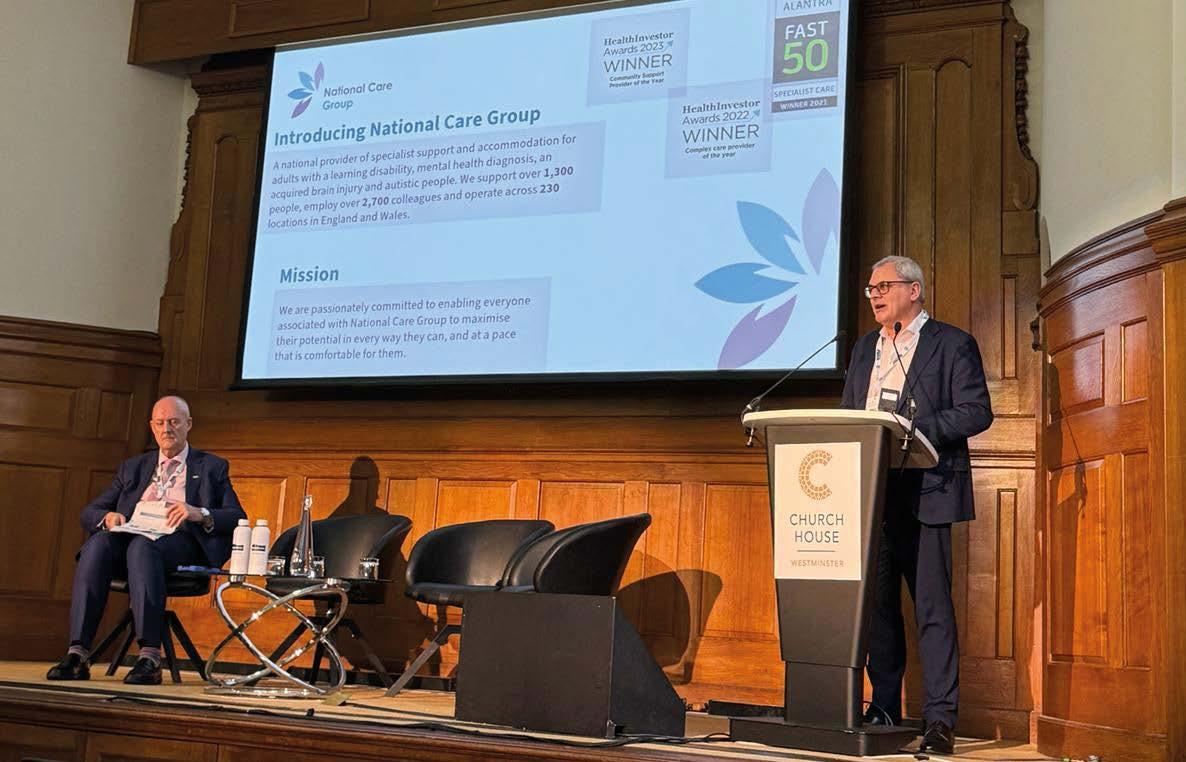
“I am immensely proud of the fact that National Care Group was one of only four recipients from the first wave of the Adult Social Care Technology Fund.”
James Allen
we don’t have vulnerable people supporting vulnerable people”.
Provider’s perspective
Offering a provider’s perspective on championing change, James Allen, chief executive of National Care Group, outlined the “woeful” underfunding of the sector and shared his concerns that nothing was offered for the sector in the Spring Budget.
On funding, Allen said “there will never be enough, so as a sector we have to acknowledge the challenge, keep fighting and get on with it”.
Allen covered workforce, technology
innovation and collaboration and coproduction in his speech and called for “comparability, equality and equity” for the sector’s undervalued workforce.
He spoke about the importance of supporting workers’ mental wealth as well as help for female colleagues going through the menopause and those suffering domestic abuse.
The care leader discussed how National Care Group had promoted better staff communication through the introduction of an employee app and spoke of the need to promote adult social care as a career of choice.
He welcomed the publication of the care workforce pathway in January as perhaps signaling the beginning of some positive times for change ahead.
Allen also outlined how providers have led a change in the delivery of specialist care from hospital to community settings.
“This sector doesn’t stand still and make do,” Allen said. “It listens, it responds, it innovates.”
Allen spoke about the benefits of using technology at National Care Group, including digital care records adoption.
“I am immensely proud of the fact that National Care Group was one of
only four recipients from the first wave of the Adult Social Care Technology Fund,” he said. The funding is being used to support the implementation of a digital email across the organisation, which will manage medication risks.
The care leader identified the use of artificial intelligence to support people with chronic mental health issues or assistive technology to support people to live more independently as other avenues for further technology innovation.
Allen also called for further collaboration among providers to attract more talent to the sector and to share experiences of digitalisation.
He stressed the importance of providers having greater input into integrated care boards and supported the creation of a Social Care Council.
Allen also discussed the need for a “shared and collaborative vision with the regulator on how we should champion change in the sector”.
“The adversarial approach, lack of trust, inconsistency and perhaps misunderstanding needs to be addressed,” he said. “We all want to improve practice and none of us wants to tolerate or condone systemic bad practice on the part of any stakeholders.”
CARING-TIMES.CO.UK APRIL 2024 | 35
James Allen addresses the conference
Do you know or work with someone who is an unsung hero in a care home?
Ontex has teamed up with Caring Times once again to reward those working in care who are always ready to go that extra mile
There are thousands of people working in UK care homes who make a real difference, whether it’s behind the scenes in the laundry room, preparing meals in the kitchen, or providing direct personal care for the residents. We’re looking for those who go beyond the job description. Whether it’s the gardener who brings residents their favourite cookies, or a housekeeper who helps residents to rediscover their hobbies – we’re searching for those who bring a little bit of extra joy into the care world.
Your unsung hero may be a colleague or someone else you know, and now is the time to reward those individuals who have made a genuine impact on their particular place of work.
If you know of anyone that fits the bill, entries can be made online at: caring-times.co.uk/care-home-heroes
So go to this link and tell us, in 400 words or less, why you think your nominated person deserves to win.
Terms and conditions

Make sure to include an example of when they have gone the extra distance to make a difference.
All winners will be announced in June and will be presented with their certificate and Love2Shop vouchers on Friday 28 June at the Care Managers Show at the NEC Birmingham. Three runner-up winners will each
This prize draw is organised by Ontex, Weldon House, CorbyGate Business Park, Priors Haw Road, Corby, NN17 5JG. It is governed by the laws of England and Wales and it is subject to the following conditions:
• The prize draw is not open to employees or contractors of Ontex or any person directly or indirectly involved in the organisation and running of the competition or their direct family members.
• The prizes are up to the value of £250 of Love2Shop Vouchers for the three runner-up winners and £500 Love2Shop voucher for the one overall winner. The Love2Shop vouchers may be substituted to an alternative gift card chosen by Ontex to the same value if required. There is no cash alternative. The vouchers will be presented to the winners on stage at the Care Managers Show at the NEC on Friday 27 June.
• The three runner-up winners will be included in the Caring Times publication during the September 2024, October 2024 and November 2024 issues. The overall winner will be included in the Caring Times publication during the December 2024 issue.
• No purchase is necessary to take part in the prize draw.
• The prize draw is open to UK residents only who are aged 18 or over.
• Closing date for entry is Friday 19 May. Winners will be notified by 1 June.
• The overall winner will receive two tickets to the National Care Awards on Friday 29 November in London.
• All winners will be presented with their award at the Care Managers Show and must be available to attend the Show on Friday 27 June.
• If the winners do not confirm acceptance of his/her prize within seven days he/she will automatically forfeit the rights to claim for the prize. In the event of the prize not being claimed, Ontex reserves the right to select an alternative winner via any means that Ontex feel appropriate.
By participating in the prize draw, you declare that you accept these terms and conditions unconditionally.
receive £250 Love2Shop vouchers, and the Overall Winner will receive a £500 Love2Shop voucher. The three runner-up winners will feature in the September, October and November issues of Caring Times magazine, and the overall winner will feature in a special feature in the December issue of Caring Times.

36 | APRIL 2024 CARING-TIMES.CO.UK care | advertorial
Care Homes Heroes 2024 offers a unique chance to celebrate the dedication of all those who go above and beyond to keep care homes running. It’s a brilliant way to shine the spotlight on people who get on with their jobs unseen and unheard, but make a real difference.
“This is the sixth year we’ve worked with Caring Times for the Care Home
Overall Winner 2023:
Heroes and we absolutely love it because it’s important to shine a light on those who go above and beyond for their residents,” comments Angela Gillespie, distributor channel manager at Ontex. “And it doesn’t have to be a grand gesture – it’s the little, consistent things that really have an impact on someone’s life.”
Last year, we received over 350 entries
David Fielding, handyman, Forest Care, Cedar Lodge Care Home
David’s love for his residents and his commitment to Cedar Lodge’s values drives him to perform brilliantly in his role as handyman, always exceeding his remit. He drives residents to hospital appointments, collects prescriptions from pharmacies and delivers blood samples to medical practices. He supports and contributes to the wellbeing of residents, shopping for personal items on their behalf, taking them out for shopping trips and willingly involving himself in activities on themed days.
David carries out all health and safety, induction and fire training for staff on an ongoing basis. He literally goes the extra mile to collect colleagues from home to ensure they can attend training if they do not have access to transport.
and it took a panel of five to decide the finalists. Gillespie continued: “It’s a difficult competition to judge because each person is so deserving. My top tip when nominating somebody is to use a particular example with lots of detail for how they have made a difference and how this impacted others – good luck to all nominees.”

“David is a good listener and takes the time to stop and chat with residents and colleagues,” says Nenita Jopson, care home manager. “If you need something doing, he replies enthusiastically straight away ‘yes, I can do that.’ David is our unsung hero.”

Runner-up 2023:
Runner-up 2023:
Vincent Doherty, facilities manager, The White House Nursing Home
Vincent has been The White House’s facilities manager for more than 30 years. Although he has been diagnosed with cancer and undergone treatment in recent years, Vincent has still shown up to work between treatments ready to support the home and his colleagues. He regularly escorts the activities team on trips so he can help residents on and off the home’s van. Vincent is much-loved by everyone at the home and makes time to talk to residents and their families ensuring they are happy with the facilities provided for their residents. He is an extremely talented carpenter, creating a dedicated visiting pod during Covid to keep residents and families safe, and even making a bar for the residents’ lounge.
Joy Clark, receptionist, The Burlington Care Home, Boutique Care Homes
As a receptionist, Joy’s role goes beyond greeting visitors and answering phone calls. She takes the time to get to know each resident, their interests and their preferences. Joy goes above and beyond to make the residents’ day-to-day experiences more enjoyable. She hosts them in the café for coffee and cake, taking the time to chat and listen to their stories. She has also set up a music club for the residents in the bistro, bringing in her own soundbar and putting together a playlist of old songs. This has been a huge hit.

Runner-up 2023:
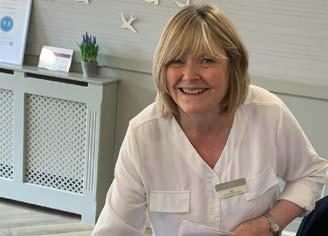
Marcia Hughes, activities co-ordinator, Thorp House Nursing Home, Kingsley Healthcare
Marcia’s drive and enthusiasm is infectious. She uses Facebook and local community pages to showcase the home, with posts shared by local dignitaries such as the mayor, councillors and the local MP. She forges strong relationships to involve the home in the community, and thanks to her there are regular mentions in the local paper. Marcia works hard to ensure no resident feels isolated, and breaks activities down so that everyone can take part even if they can’t leave their room. Through a Wishing Tree she has encouraged residents to find new zest for life. Marcia sends monthly newsletters and activities planners to all the families ensuring they know what’s going on, and to see if they wish to attend anything.
CARING-TIMES.CO.UK APRIL 2024 | 37
| care
advertorial
Save time, increase care
Stephanie Nimmo, communications and engagement lead, Digitising Social Care at NHS England, explains how going digital helps increase efficiency, improves care quality and saves time
As an ever-increasing number of care providers are making the leap to ditch paper and embrace digital approaches to care planning, they’ve been sharing their journeys with us and telling us why they’ll never look back.
One of the biggest selling points for adopting a digital social care record solution (DSCR) is the amount of admin time it saves. Each member of staff spends an average of one hour less per shift on admin, according to care providers who have made the switch. That adds up to a lot of time.
But it’s not just the time saved. Providers are telling us how going digital has really helped improve the quality of information they capture in a care plan. For example, there are prompts to remind staff if they’ve missed out a field and voice-to-text functionality makes things a lot easier for people who struggle with writing. As one registered manager told us: “It’s also less stressful for our team – they don’t have to sit down and handwrite notes, and they don’t have the frustration of working hard to find that time and then being told it’s not detailed enough, because the DSCR
“Now we get reminders when care plans need updating, which is really helpful for senior carers and managers. They go orange and red automatically, so it’s really easy to keep track.”
Supervisor – Residential Care Home
platform has all the prompts and fields we need.”
We’re also hearing some great feedback on how it’s helping managers complete audits more efficiently and how onboarding new colleagues takes a fraction of the time. Handovers are being transformed as information and updates are captured during a shift and are readily available to review for the person taking over. It’s about putting the relevant information into the hands of the person who needs it, when they need it. This also means alerts get through to managers immediately so there’s less delay in taking action.
While some providers are in the early stages and using the basic functionality of a DSCR solution, others are embracing some of the wider applications that paper systems could never provide. More than 1,400 provider settings are accessing GP records via their DSCR solution. This means that day or night, a care professional can access vital health information to ensure they’re following the most up-to-date changes for the person they are supporting. It minimises delays as well as risk and saves lots of time making calls and chasing for updates.
Some providers are using family access portal functionality via their DSCR. This means families can be involved in their loved ones’ care and check how they are doing wherever they are. It gives them great reassurance and also means there are fewer phone calls to be answered so staff can concentrate on the people in their care.
The new-found time and increased efficiency that DSCR solutions have brought about are being used in lots of exciting ways. Here are a few of the changes we heard about when we visited a large residential provider recently:
• Care professionals have more one-toone time with people.
• Activities are now arranged over the
“Incident forms and reporting have got a lot better… you can do immediate analysis, record complaints and keep them updated –it’s a much better and more open process.”
Registered Manager –Nursing Home
weekend and not just limited to weekdays.
• Managers are doing more walk arounds and checks of the care home.
• People are leaving work on time rather than working over to write up notes.
The benefits really do speak for themselves. Are you on the fence about making the move away from paper to digital? Did you know there’s funding available to help you get set up with a DSCR solution? Plus there’s loads of support to help you on the journey, including digital skills training to help with choosing the right supplier.
There’s a digital lead in every integrated care partnership across England who can help you access funding support and they’ll guide you through the process. Drop us an email at england.dscr.enquiries@nhs.net and we’ll give you their details. Or have a look at our website digitisingsocialcare. co.uk to find out more.
The Digitising Social Care programme is funded by the Department of Health and Social Care We’re a joint unit of DHSC and NHS England staff working on delivering the government’s commitments to support the digital transformation of adult social care.
38 | APRIL 2024 CARING-TIMES.CO.UK care | care for tomorrow
Meet Alfred – your friendly robotic waiter
Lee Peart meets the new technological addition to the care team at Lovett Care’s Fairfax Manor in Harrogate, North Yorkshire
Arriving at Fairfax Manor’s new state-of-the-art, 90-bed, luxury care home I take a seat in its strikingly designed Orangery with my host, assistant general manager Nicola Goodsall.
As we wait for our electronic friend to appear, the first hint he’s on his way is a soft, repetitive ring tone.
“He plays a twinkle tune as he goes along so that people know he’s coming,” Goodsall tells me.
Right on cue, ‘Alfred’ appears from an adjoining corridor.
He’s an amazing sight as, slightly unnervingly, he glides effortlessly towards us with his signature ring tone.
Standing four feet tall, Alfred is a robotic Servi+ foodservice solution developed by Bear Robotics. Equipped with a touch screen to programme his destination, Alfred can make up to four consecutive trips to deliver food and drinks to residents or team members.
“Alfred has multiple uses,” Goodsall says. “He can send cutlery and cookery back to the kitchen to be washed, or deliver food or drinks to residents’ rooms.
“If we are going to send Alfred to a room, we first make residents aware so
“Alfred’s very useful. If I am busy I can use him to send someone a drink. I can also use him to send activity packs to people in their rooms if they don’t want to engage in group sessions.”
– Paula, activities lead

they are expecting him when he arrives. He will then wait outside until they take their tray from him.”
Having made his deliveries, Alfred is programmed to return to three docking stations in the bar, kitchen or the dining room where he will wait patiently for his next task.
Nichola says the response of residents and families to their high-tech helper has been universally positive.
Judging by the reaction of people in the home, Alfred is clearly a popular addition, but I ask if there are not risks in having a robot roaming freely in an environment surrounded by frail and elderly people?
“Like anything in care, you are assessing the situation at that moment in time about whether it is appropriate to be using him,” Goodsall says.
She explains the robot is being used on the home’s ground floor where more able-bodied residents live in order to minimise any risk. Goodsall also points out that Alfred is equipped with sensors so that he stops automatically in the event of any obstacles. He will pause for 30 seconds before calculating his way around the obstacle and moving on.
“We do have residents who will stop in front of him on purpose so that he has to change his route,” Nichola laughs.
With Alfred causing such a buzz of
excitement, word is spreading fast of Fairfax Manor’s popular new addition.
“Our neighbouring home has said they would love to have him, but he’s going nowhere,” Goodsall asserts. “We’re keeping him here!”

CARING-TIMES.CO.UK APRIL 2024 | 39 care for tomorrow | care
Alfred is equipped with four serving trays
Ease the pressure
Daniel Hodgkiss, assistant programme manager at Health Innovation West Midlands, says better prevention and identification of health problems in the elderly can lighten the burden on the NHS
It’s no secret that the NHS is operating at full capacity, with increased 999 calls, ambulance conveyances, and hospital admissions, with limited resources to meet demands.
A significant contributory pressure on the NHS comes from care home residents aged over 85, who have varying degrees of frailty, complex healthcare needs, and often have long-term conditions including dementia.
Sadly, care home staff are trying to treat a variety of patients with different issues, which often means deterioration is not identified and timely treatment is not given.
This results in increased pressures on the NHS system, with care home residents making up 8% of admissions to A&E and emergency departments, despite being 2.8% of the overall population. By implementing detection and prevention measures as part of thorough deterioration management processes in care homes, pressures on the NHS from care home residents could be mitigated.
To improve deterioration management processes in care homes, the Health Innovation West Midlands’ (HIWM) Patient Safety Collaborative worked with partners including six integrated care boards across the West Midlands on the ‘Improving Deterioration in Care Homes’ programme. The
“The results of the programme demonstrate the positive effect detection and prevention measures through deterioration management processes have in mitigating NHS pressure.”
programme aimed to create long-term and sustainable change across the entire pathway of care, with deterioration networks established at both regional level and Integrated Care System (ICS) level to accelerate learning, share best practices, and roll out a deterioration strategy that was bespoke to each area.
HIWM also supported the creation of a ‘Care Home Deterioration Resource Pack’ for each ICS, developing sustainable training for care home staff, and signposting services specific to each area. In addition, the programme produced a webinar series targeted at care home staff, general practitioners, and advanced nurse practitioners to increase confidence, knowledge, and level of adoption of deterioration tools across pathways.
The project engaged and supported 1,679 care homes, of which 1,431 (85%) adopted deterioration management tools. 919 (55%) care homes continued the use of deterioration tools for upwards of 12 months after the project ended.
Following the programme, HIWM worked with the Midlands and Lancashire Commissioning Support Unit to explore a minimum data set to demonstrate its impact. Between January 2021 and September 2022, there were 2,960 fewer 999 calls, resulting in savings of £19.94 per care home. There were also 42,382 fewer emergency admissions, resulting in a saving of £13,590 per care home, and 36,204 fewer bed days. The modelling report also noted that adopting deterioration management tools within care homes across the six integrated care boards in the West Midlands exhibited a potential non-cash releasing total saving of £15 million.
The programme hasn’t just had positive effects on the NHS; care home managers have also reported staff are more confident in recognising deterioration earlier and can escalate the most appropriate healthcare using the escalation pathways.

One manager explained: “My staff have greatly benefitted from the project – it has improved their knowledge, skill, and confidence in obtaining correct vital signs, understanding the meaning of these vital signs, and be able to act swiftly. Our residents have truly benefitted as we have seen a decrease in hospital admissions, where treatment can be given in the home. Hospital admissions not only cause distress to our residents but their loved ones, so enabling to care for our residents within the home has been a large benefit.”
The results of the programme demonstrate the positive effect detection and prevention measures through deterioration management processes have in mitigating NHS pressure. If the measures explored by the programme were to be implemented nationwide, this would significantly reduce pressures on the NHS, resulting in increased capacity, reduced costs, more available beds and in turn, improved experiences for care home staff and better patient outcomes.
To find out more about the programme or get involved with our continued work to improve outcomes for deteriorating patients, please contact daniel.hodgkiss@ healthinnovationwm.org.
40 | APRIL 2024 CARING-TIMES.CO.UK business | health innovation
Daniel Hodgkiss
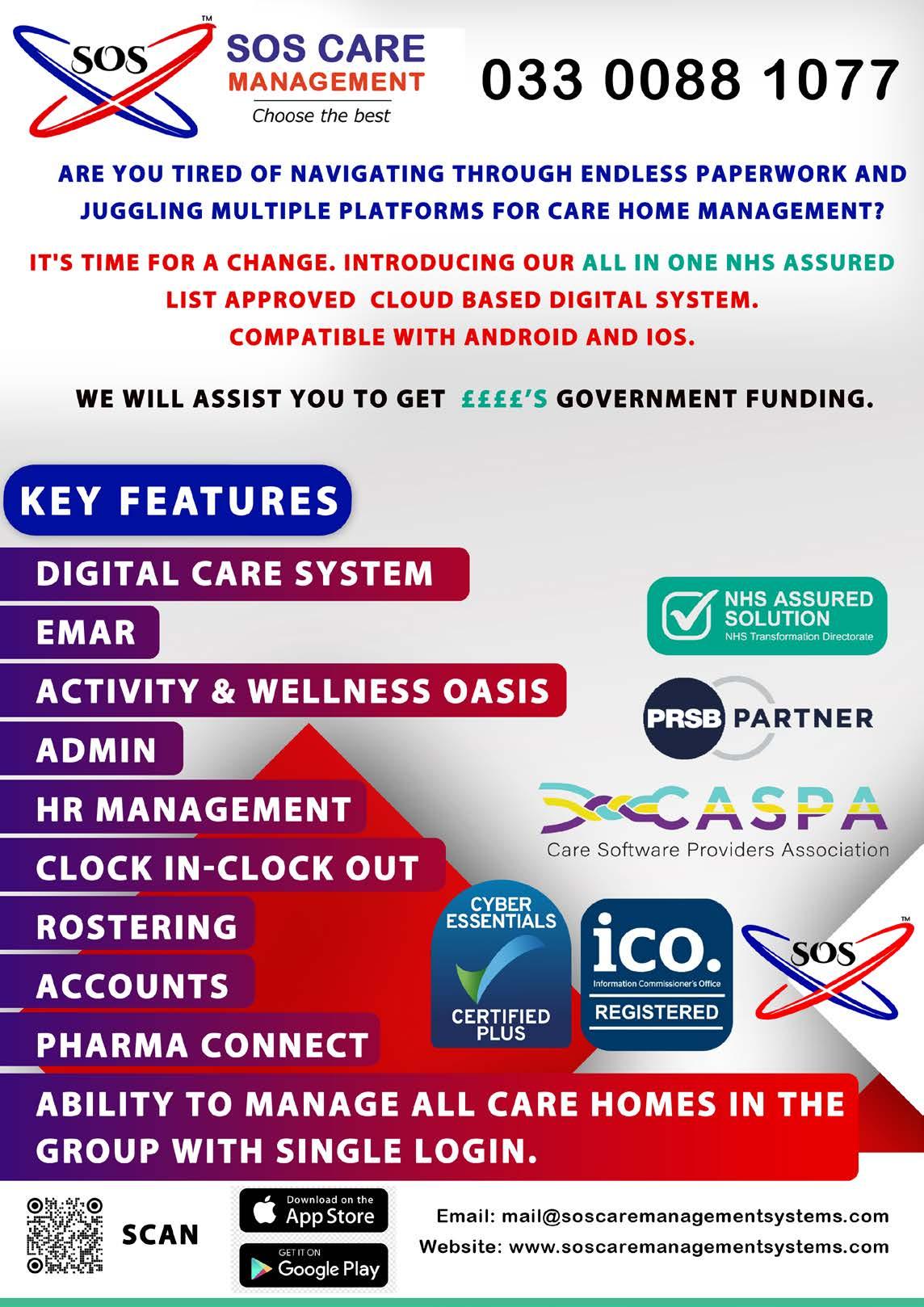
Creative Caring
As always, carers have been demonstrating their creativity through fun and innovative events for their residents

Honey bunny
An enormous rabbit named Sassy paid a visit to Aspen Grange Care Home in Braintree, Essex courtesy of the RSPCA. Sassy hopped around the home, part of the Opal Group, visiting residents in their common areas and private rooms. Sharon Thompson, manager at Aspen Grange, said: "Seeing the smiles and hearing the laughter that Sassy brought to our home was incredibly heartwarming.”

Free lunch
Avocet Court Care Home in Ipswich has launched a weekly lunch club for over 65s. The lunch club promises a free home-cooked roast lunch and a delicious dessert. The club aims to foster connections and companionship in the local community.

Another brick
Residents of Winchester care home St Catherines View used hundreds of Lego blocks to make models of a flower arrangement and fish swimming inside a tank. In guided sessions
focused on therapy and reminiscence, team members at the Colten Care home invited the participants to use their imaginations and get creative. Companionship team leader Laura Sheldrake said: “This was a trip down memory lane as our residents remember doing Lego with their children.”

Generation games
Residents of Aria Court Care Home in March, Cambridgeshire came together with local children during the school holidays to take part in generation games. From colouring sessions to friendly competitions to taking part in games on the interactive Omi table, the games fostered social interaction, mental stimulation and emotional wellbeing, while bridging the generation gap.

Memory lane
Residents at Barchester’s Oak Grange Care Home in Chester were treated to a visit from the House of Memories, an initiative run by National Museums Liverpool. House of Memories is a dementia awareness programme which offers training, access to resources, and museum-based activities to enable carers to provide person-centred care for people living with dementia. Residents took it in turns to explore items
including old football programmes, scarves and rattles, tea cards and soaps.

Cat nap
Residents at Friends of the Elderly’s Redcot Care Home in Haslemere, Surrey celebrated National Cat Day with Socks and Slippers, the care home’s two loveable, good-natured and friendly cats. The feline brother and sister were adopted by the home in 2021, and the team has noticed that playing with and stroking the cats has a positive impact on residents’ wellbeing. One resident, Susan Osbourne, even sleeps with the cats on her bed.

Hit the jackpot
Portsmouth care home Portsdown View held a Casino Night to raise money for charity Dementia Support. Residents, families and the local community were invited to play games of roulette, blackjack, and croupiers with cocktails and canapés served on arrival. Guests took part in the gambling using ‘fun money’, with entrance fees raising more than £940 for the charity.
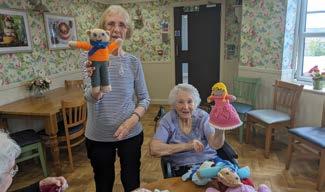
42 | APRIL 2024 CARING-TIMES.CO.UK care | activities news
Crafty coffee
Hepworth House Care Home in Wakefield, West Yorkshire has launched a weekly crafts and coffee morning group, the Knitwits. People from the local community are welcome to bring along any crafting project they’re working on, have a hot drink and a cake, and enjoy some quality creative time with the residents at Hepworth House. Home manager Helen Batty said: “This type of social gathering promotes relaxation, mental wellbeing, and the development of new skills.”

Culture club
Team members from a dozen countries helped Colten Care’s Abbotts Barton in Winchester put together a day to celebrate cultural diversity. The fun featured music, dancing, national costumes, traditional culinary treats and displays highlighting different regions and customs. Countries included Nepal, India, Sri Lanka, the Philippines, Togo, Ghana, Nigeria, Morocco, South Africa, Ukraine, Poland and Estonia.

Bell of the ball
The Launton Handbell Ringers paid a visit to Launton Grange, a care home in Bicester, Oxfordshire, after resident and former member Rosemary Henson said she would like to see the group play again. The group founded in 1951, performed for residents, and Rosemary joined in.
Behind the bar
Limetree Care Home in Brixton unveiled its newly renovated pub, The Lambeth Arms. The Excelcare home aims to create different environments where residents have the opportunity to engage in their favourite pastimes and visit different settings. Resident Peggy, who spent more than 35 years as the landlady of a local pub, was eager to explore the space and relive memories.
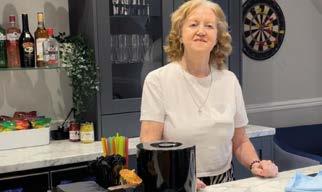
Radio star
Bob Allan, 94, from Care UK’s Oakfield Croft Care Home in Sale, Greater Manchester, made a special appearance on Radio Alty –Altrincham Football Club’s dedicated station. Radio Alty broadcast from the home to give superfan Bob an opportunity to appear on the show. Bob shared his memories of past match days, key players and the history of the club. After the show, he was presented with hospitality tickets.

Back in the saddle
When the team at Care UK’s Mill View Care Home in East Grinstead, West Sussex learned that 74-year-old Liz Hindson was an avid horse rider in her youth they were determined to help her get back in the saddle. Liz spent her younger years in Zambia where she looked after her own horses. The team organised a visit to Little Brook Equestrian in Linfield, where Liz was able to ride around on a horse named Guy.
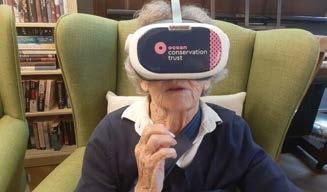
Submerged sensation
Residents at Vale View Heights in Sidmouth, Devon, enjoyed a deep sea experience thanks to virtual reality headsets provided by Plymouth Aquarium. The Aquarium team helped 12 residents don their headsets and experience life under the sea for a few hours with programmes such as ‘In the shark tank.’

Dog days
Care UK’s Foxbridge House in Orpington, Kent held its own version of dog show Crufts. Team members and residents’ relatives were invited to showcase their dogs’ skills and good looks. Judges included the mayor of Bromley and the home’s oldest resident, Peter Lemon, aged 103.

Celebrity chef
BBC MasterChef winner Jane
Devonshire hosted a cookery class and Q&A at Signature at Highgate in London. Residents learned how to utilise every part of ingredients, from using leftover carcasses to creating flavourful gravies, to turning carrot skins into a rich stock. The celebrity chef codesigned the seasonal menus and recipes at every Signature home.
CARING-TIMES.CO.UK APRIL 2024 | 43 activities news | care
Age differently
Dr Zoe Wyrko, wellbeing director of Riverstone and an authority on living and ageing well, offers a fresh take on later living
Thanks to research, we now understand more about what are, and probably more importantly, what aren’t, the inevitable consequences of ageing. However, just knowing isn’t enough – the next stage is all about ‘doing’. We need to put this knowledge into action to influence positively those who are older now, and those who will be old in the future –hopefully all of us.
Unless someone is already living a perfect life, any type of health promotion or ageing well programme is going to involve a degree of behaviour change. If I want to make a change to my lifestyle, I can simply decide to do so and just get on with it – there’s only one person to think about and no one else I need to influence. However, for individuals who require support or care to remain independent, or those who might already be residing in a care home or other supported living environment, there are potentially many more people who need to be involved (and even convinced) in order to make a simple change.
The psychology of behaviour change is a huge field in its own right, one in which I won’t pretend to be an expert in, however, there are some principles that I have found useful in my work.
"Unless
someone is already living a perfect life, any type of health promotion or ageing well programme is going to involve a degree of behaviour change."

1 Knowledge is power
Understanding ‘why’ is important, and sometimes this can mean going back to the foundation of what we think we know. Everybody who joins Riverstone undertakes a training session on ageism, and it usually comes as a surprise to discover how ageist we are as a society, and how this influences so many people’s approaches to older adults. I can recommend the resources produced by the Centre for Ageing Better.
2 Allow people to find the solution for themselves
Implementing a plan or change might be effective in the here and now, but is unlikely to work well for the long term. Behaviour change is so often about gradual changes and small steps; it’s only when you stop and look back you can see how far you’ve come. Equipping people with the knowledge they need and providing support to do the right thing can
lead to the type of co-design that produces life-changing impacts.
3 Check our own beliefs
It can be too easy to impose our own beliefs and preferences, even if they might not be the right thing overall. For example, I disliked chair-based pilates classes as they seemed to be about taking the easy option. However, the wellbeing team at Riverstone has shown me that they act as a gateway to exercise for those who are anxious about getting on and off the floor and have a really positive impact.
Realising the importance of this work in the short term will inevitably lead to long-term change, and potentially contribute to a healthy and happier workforce in the future.
For more information on how Riverstone is revolutionising retirement for people over 65, visit: riverstoneliving.com
44 | APRIL 2024 CARING-TIMES.CO.UK care | wellbeing

Join our mission to bring people together and end loneliness.
Support a socially driven, charitable organisation committed to reducing feelings of loneliness and isolation, by encouraging intergerational bonding through the pairing of volunteers with the older persons' community.
How can you help?
Download our app Sign up as a volunteer today!

Register your care home!


Become a Sponsor!
Help us to grow our charity - find out more on our website!
With thanks to our sponsors and partners:


Our initiative is endorsed by CQC and we would love to have more care homes and older people to pair with our volunteers! hello@adoptagrandparent.org.uk





“Speaking to Ruby has become the highlight of my week; I always look forward to receiving her calls.”
Iris, ‘Grandparent’




www.adoptagrandparent.org.uk
Mind your language please
Iwas asked the other day if I thought that things had improved in the dementia world in the past few years and I said emphatically “Yes”, with more TV exposure, media, films and more people talking about it, how could it not have improved? But there was a time a while ago when the dementia language police made an appearance and said we couldn’t use this word or that word. I was absolutely horrified and still believe it did more harm than good. Here’s a perfect example…
Oh no, you cannot use the word “suffering” when it comes to dementia, you cannot say: “They are suffering from dementia.” What on this green land we call earth were they thinking about?
Let’s get this into perspective, don’t we all, and I mean all, say we are suffering from a cold, headache, migraine, back ache etc? Then why would we be not allowed to say suffering from dementia?
It’s the most ridiculous thing I have ever heard and I know after being contacted by carers around the world it’s a word they use and will still use. I lost both my father and grandmother to dementia, and when they were both in late stages, they were so confused, so frightened, surrounded in a hospital by complete strangers as they didn’t recognise the people around them, when they were really loved by the ones around them. Please tell me they were

not suffering, please look into the eyes of those with dementia who don’t know what day it is or if it’s day or night, or suffering (that word again) from horrific night terrors and hallucinations like myself that what they are going through isn’t suffering. And yet we make light of the word for everyday illnesses that are not terminal.
The second book I wrote was called Silent voices: Poems by an Alzheimer’s sufferer and I was absolutely lambasted for using the word suffering. Who are these people? Have they ever actually lived with someone who screams all night wanting their mum or dad as they are so frightened in the world they are in? It does make you wonder.

Then, to top it all off, we were told we could say “living well with dementia”. Well, that’s very good of them isn’t it? So what does living well with dementia actually mean? Does it mean those few hours when people like me are lucid enough to write things like this, or go to the shop for a newspaper, or hold an intelligent conversation with someone?
If that’s what they mean I would hardly call it “living well” – would you? When the other hours of the day are either spent in dementia’s grip of terror and fear, or in the uncertainty about what’s going to happen next. Lewy bodies is my type of dementia; I was misdiagnosed at first with Alzheimer’s before it was confirmed, hence the name of Alzheimer’s being used in my first three books. You see with Lewy bodies you can sometimes, and I must stress sometimes, recall what happened more than you can if you had Alzheimer’s, so when I am in the middle of town being chased by someone no one else can see – I call him the shadow man – and I am screaming and shouting for help, am I not suffering then?
Then as I wake the day after and remember what happened the day before, knowing I have absolutely no control of what may happen today or my actions as dementia takes over my brain without warning, how do you think I feel then?
Till next time…
care | norrms’ blog 46 | APRIL 2024 CARING-TIMES.CO.UK
Regular columnist Norrms’ McNarama reflects on what it’s like to live with dementia
Housekeeper of the month
Melissa Harvey-Pemberton, head housekeeper at Care UK’s Highmarket House in Banbury, Oxfordshire, tells us how she goes the extra mile
Tell us a bit about your background –how did you get into care housekeeping? I started working in the care industry over 30 years ago. A decade of my working life has been in housekeeping, but I started out as a carer and then worked as a head chef before trying my hand at housekeeping and really enjoying it. I became head housekeeper at Highmarket House in 2020.
When I joined, I had to build a new team from scratch – and then the Covid-19 pandemic hit. During the pandemic, I became the infection prevention and control (IPC) champion, and we successfully kept Covid-19 out of the home, which was a fantastic achievement.
How do you go about meeting the needs of residents?
I work across the home, managing a team of seven and liaising with different teams to ensure IPC audits are performed regularly and that all colleagues are compliant. I aim to achieve the highest standards of cleanliness and infection prevention and control in the home every single day.
What’s a typical day like? No day is ever the same. I’m sure everyone says that, but that’s what working in this sector is like. I start my checks around 7am, and from there I will allocate myself and my team to individual tasks on different floors. Before the end of every day, I complete thorough checks to ensure the home is up to standard. As well as my housekeeping tasks, I like to get involved with activities in the home where possible.
One of our local schools had a careers week recently, so I was able to promote the home and highlight how special being part of a housekeeping team really is. I recently set up a Friday senior social group after the local community’s regular club was shut down. Over Christmas, I organised, collected and delivered 37 food parcels for elderly people living in the community.
What is the most challenging part of your job?
The hardest part of my role is finding the time to do everything I want to do. Luckily, my team and I are very good at

allocating tasks so everyone splits the daily load, but there are definitely some days where you wish there were more hours in the day.
Is there anything that would surprise people about your job?
We are so much more than what people think housekeeping is – we do more than laundry and changing beds. I personally love to spread my ideas throughout the home, and often meet with the activities team to share any ideas I think residents would enjoy.
I helped a resident who was on endof-life care with hand therapy. I think that’s something that people wouldn’t expect from head housekeeper.
Has anything changed since you started your role?
A big change I’ve noticed since starting my role is how well my team work together and the difference it makes to residents daily. When I first joined, I had to rebuild the team entirely, so seeing how strong we are now, it’s a great improvement.
What’s special about the care home you work for?
It’s a cliché to say, but we are all like one big family at Highmarket House. The idea that life ends when you enter a care home is so wrong, I like to believe we give residents a new outlook on life and being an older person.
What skills and talents do you need to be a great housekeeper?
You need to have an eye for detail, and extremely high standards for cleanliness. Taking pride in what you do every day, and being able to have fun while doing it, is the main thing. If you want a home to be the best, you need to put the effort in and be there for residents and your colleagues.
CARING-TIMES.CO.UK APRIL 2024 | 47 support staff | care
Melissa Harvey-Pemberton
Serve well-balanced diets
Danforth Care Group, who has collaborated with Dr Theocharis Ispoglou, a Leeds Beckett University reader specialising in nutrition, discusses the importance of a highly nutritious diet, especially in older adults.
For older adults, prioritising a nutrient-rich diet is crucial,” says Ispoglou. “As with anyone, older adults who do not consume the necessary nutrients our body needs – and in the correct amounts – can lead to a range of physical effects and health complications. This is due to the risk of sarcopenia, a muscle-wasting disorder, which is a key contributing factor to many diseases and health complications.
“Poor nutrition can contribute to feelings of sadness, hopelessness and lack of energy, which are common symptoms of depression; inadequate intake of essential nutrients can impair cognitive function and therefore increase the risk of cognitive decline and neurological disorders such as dementia.”
Get the right nutrition
“If you’re looking after someone at home, ensure they have the support they need to be able to buy fresh food,” says Greta Hoxha, chef at care home Heatherton House in Derby. “Make sure they have the right equipment to cook meals safely and have the correct glassware to stay hydrated. You can also support with cooking batch meals,
“As with anyone, older adults who do not consume the necessary nutrients our body needs –and in the correct amounts – can lead to a range of physical effects and health complications."
as they are easier to then reheat for an older adult.
“At Danforth, we ensure that our menus are nutritionally well balanced,” says Hoxha. “We look at everything from protein, carbohydrates, vitamins and even colour so they have a visual appeal.
“It can also help to create meal plans around what your loved one likes to eat,” adds Louise Brown, head chef at Old Norse Care Home in Grimsby, Lincolnshire. “We hold monthly nutrition meetings with the residents, which allows them to suggest new ideas for menus and foods they wish to see on these.
“For those living with dementia who may not be able to express their likes and dislikes, we seek support and information from families to help us with this information.”
The importance of hydration “Dehydration can impair cognitive functions such as memory, focus and alertness, which in turn can affect daily life and overall wellbeing.” warns Ispoglou. “Hospitalisations, medical complications, and an increased risk of kidney and metabolic diseases are further consequences of not staying properly hydrated, and symptoms such as headaches, fatigue and mood changes can disrupt daily activities.
“However, it is also important not to overlook the risks of overhydration, which can also have serious consequences. Overhydration can also affect cognitive function, causing confusion, disorientation, and in severe cases seizures or coma.”
Get the right hydration
“To prevent dehydration and underhydration for older adults, the British Dietetic Association recommends a daily water intake from drinks of about 1,600 ml (approximately six-to-seven cups) for women and 2,000 ml (about eight-to-

Dr
“However, it is also important not to overlook the risks of overhydration, which can also have serious consequences."
nine cups) for men,” says Ispoglou.
“While these recommendations relate to fluids consumed through drinks, it is important to note that about 20-30% of our hydration needs can be met through the consumption of water-rich foods such as soups, stews, fruits and vegetables. Hence, achieving proper hydration in older individuals should involve a balanced intake of both water from drinks and water-rich foods.”
“If you’re looking after a loved one at home, to ensure they stay hydrated, ensure a minimum of two drinks are offered with each meal, and offer tea and cold drinks throughout the day. Make sure they have access to a drink at all times, and record the amount they have consumed,” recommends chef Brown.
48 | APRIL 2024 CARING-TIMES.CO.UK care | food & nutrition
Theocharis Ispoglou
Level 2 Care Certificate

Did you know there are 37,000 fully funded positions available for the upcoming Level 2 Care Certificate?
This has been confirmed by the Department of Health and Social Care and Skills for Care. The qualification will provide new and existing care professionals the opportunity to refresh or improve their knowledge and skills needed to work competently in health and social care.
OFFER
No Set Up Fees to become an Approved NOCN Centre + 50% off registrations when you sign up for the Level 2 Care Certificate!
We are waiving all set up and approval fees associated with becoming an approved NOCN centre, resulting in a significant saving of £650.
That’s not all!
We’re also thrilled to offer an exclusive 50% discount on learner registrations for the Level 2 Care Certificate. Offer ends 31st October 2024*.



*Terms and conditions apply Call: 0300 999 1177 | Click: www.nocn.org.uk | Email: business-enquiries@nocn.org.uk





IF YOU ARE LOOKING TO SELL YOUR CARE BUSINESS, Contact our managing director Nick Greaves on: 07943 107 887 | nick@ngacare.co.uk | ngacare.co.uk 50 | APRIL 2024 CARING-TIMES.CO.UK Name of property sold: Location: Registration: Purchaser: Seller: Price: Business transfer agent: Contact person: Name of property sold: Location: Registration: Purchaser: Seller: Price: Business transfer agent: Contact person: Name of property sold: Location: Registration: Purchaser: Seller: Price: Business transfer agent: Contact person: Name of property sold: Location: Registration: Purchaser: Seller: Price: Business transfer agent: Contact person: Name of property sold: Location: Registration: Purchaser: Seller: Price: Business transfer agent: Contact person: Canal Vue Derby 70-bed nursing home Springcare Undisclosed Undisclosed NGA Care Nick Greaves – 07943 107 887 Pine View Residential Home Leicester 12 Undisclosed Undisclosed Undisclosed NGA Care Nick Greaves – 07943 107 887 Melbourne House Nursing Home Nottingham 48, care home with nursing Springcare Undisclosed Undisclosed NGA Care Nick Greaves – 07943 107 887 Alexandra House Nursing Home Nottingham 38-bed care home with nursing Springcare Undisclosed Undisclosed NGA Care Nick Greaves – 07943 107 887 Park House Nursing Home Nottingham 68-bed nursing home Springcare Undisclosed Undisclosed NGA Care Nick Greaves – 07943 107 887 Derbyshire Leicestershire Nottinghamshire Nottinghamshire Nottinghamshire
property
care | business &








































































































































